#once again illustrating how interconnected these things are
Text
Move over, “gay propaganda”: Russian lawmakers are drafting legislation that would ban the propagation of “child-free” lifestyles in the mass media. Russian officials have warned that “child-free” threatens Russia with “demographic decline” and “the disappearance of the whole nation.”
#they've been saying this for a while#and it is being paired with the ramping-up of abortion restriction *and* going after LGBTQ rights#once again illustrating how interconnected these things are
175 notes
·
View notes
Text
ROUND 2, MATCH 24


Propaganda under the cut!
Dys
Propaganda
great character shitty boyfriend theres two paths to get a happy couple ending with him peace ending (with prolific parent career ending or dys dating both solanaceae (player character) and sym with sol being the unfavored in the polycule) or becoming a gardener (mass interconnected ai that both is n takes care of the planet the game's set on. he wants to become a sentient tree basically) with him (assisting in helping him bomb the colony or helping him become a gardener after he bombed the colony) all the other endings where he and solanaceae are dating Arent Great with peace ending (without prolific parent or polycule) in particular standing out to me especially in comparison with his friendship peace ending in that solanaceae is implied to be his sole source of emotional support (even if you get him and tangent to reconcile during the game) as in his platonic peace ending hes noted to have made other lifelong friends and has become a part of the community which is absent in his romantic ending and instead replaced with solanaceae stating that dys' love feels draining n dys' self destructive habits are a frequent topic in the couple's conversation but its just kind of brushed aside cause solanaceae's like "well theres parts of myself (referring to the timeloop) that other people wouldnt be able to deal with so its fine" n then also ur not really allowed to get mad at him for bombing the colony (resulting in an unspecified amount of injuries and deaths) and if you choose to say "because you cant!" as a response to finding out he set off the bomb to become a gardener (btw dys' only leaves a goodbye note if ur dating but never makes any attempts to prevent solanaceae from potentially also being killed by the bomb like you cant die during the game but he still doesnt show any level of concern that the four people he likes in the colony couldve been killed even if hes dating solanaceae) dys' response is something along the lines of "who cares what you think cause you'll be dead in 60 years" which (once again) doesnt change even if youre dating him n like the bomb thing and him always eventually leaving to become a gardener are like nonfactors in this aside from when they align with his shitty boyfriend moments such as his seeming disregard for his romantic partner's life if they dont like what hes doing i literally went into the game's files to read all of the storylines n events to see if i was missing something but no man's just a shitty boyfriend
Peter King
Propaganda
Oh I could go ON AND ON but here’s a list: He’s a stalker, he showed up late to a date HE REQUESTED, he killed either your landlord, roommate, or coworker (depending on route) and stuck them in a freezer, lied to the police about it, followed by a car ride either consisting of traumadumping about his family (valid tbh) or him talking about how much he wants to fuck your brains out, then you finding a bloody knife in his glove compartment, asking about it, and him smashing your head into the window to shut you up while he takes you to his house. He is The Worse Datable, as well as The Only Datable because well…he killed the others…and kidnapped you….
FUCK THIS DUDE!!! Country Human looking-ass bitch, I want him dead and obliterated
Many violence, Yandere behavior, cut your leg off in a semi-canon series of illustrations, smashed your head into the passenger side window of his creepy van, chloroformed you in your own house, brought you flowers that were probably tainted with his own blood, given context from another route. Generally a terrible person. Also just very strange to look at :/
He knows what he did….😒
He broke into Y/N’s house and chloroformed them. Generally a really creepy and perverted guy. TK is better :/
8 notes
·
View notes
Photo
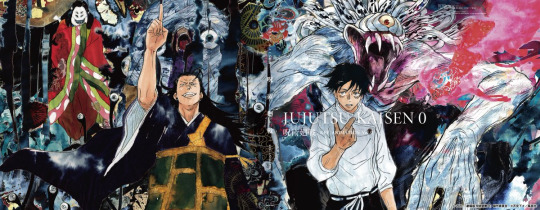
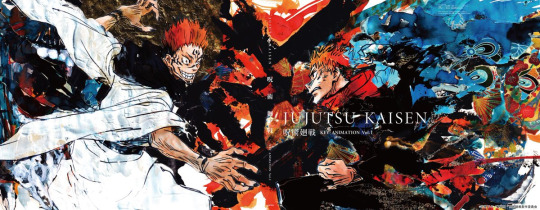
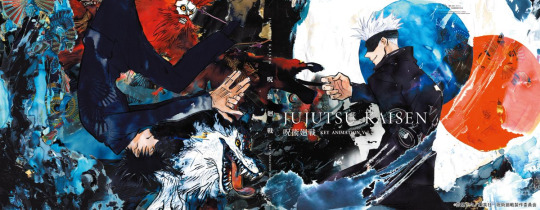
Just cross-posting a bit of my own deep-dive musings I’d initially keysmashed over on twitter about the JJK0 and JJK key animation artworks here:
I love how when all three covers are juxtaposed together like this, it seems, at first, to hint at Megumi’s gradual “fall” in the story. That he, like Getou, may eventually trudge down the path of an antagonist and switch over to opposing sides, aligning himself with either Sukuna and/or Kenjaku’s ideals instead of Yuuji or Gojou.
However, I’d like to think of these artworks not as hard foreshadowing of where the plot is heading with absolute certainty, but merely as a visual interpretation of the characters’ design concepts that illustrates their roles within the narrative itself – particularly, with the Vol.2 artwork which features Megumi and Gojou.
At a cursory glance, it might seem that Gojou would have to fight yet another jujutsu sorcerer from within his own circle (his own ward and student this time), mirroring his past falling-out and broken friendship with Getou. That Gojou and Megumi — both the current heads of their respective clans, and inheritors of each clan’s most prized cursed techniques, Six Eyes and Limitless vs. Ten Shadows — are bound yet again by fate to fight one another to the death, as their ancestors have always done in the past due to bad blood and clan rivalry.
Still, if you think about it within the events occurring in the canon now, even if Megumi is visually placed on the same “villain” side along with Getou and Sukuna here — in actuality, he still doesn’t quite fit the role of a (budding) antagonist/villain, let alone a rival. At least not at this point in the story. Of course, I don’t claim to know what goes on in Akutami’s brain, and may be wrong in future as the plot unfolds further. But for the moment, I personally don’t feel that’s what Akutami is going for, especially when we consider how hard Megumi has been working with the other Juju Tech sorcerers to find a way to unseal Gojou, and how viscerally devoted he is to keeping Yuuji safe and beside him always. It’s pretty obvious right now whose side Megumi is on, despite everything that had happened in Shibuya; he’s pretty much ride and die all the way for Yuuji, even at the expense of his own personal safety if Sukuna manages to be unsuppressed once more.
Another interesting thing to note is how Megumi is the only one who is drawn inverted on the covers. Which, again makes me think that this is done to represent his characterisation within JJK, not merely as plot foreshadowing. He is, after all, designed to look (at first) like the seemingly cold and harsh shounen rival that typically goes against the main character with their clashing ideals, but as we know, Megumi is anything but that, being Yuuji’s closest friend and most resolute supporter. He is quite literally an inverse of said shounen rival archetype.
Megumi being drawn inverted and on the “wrong” side could also be a glimpse into his perception of his own self: that he doesn’t think of himself as being inherently right, or a good person like Tsumiki and Yuuji (hence his whole “I don’t care if I’m right or wrong; I only believe in my own conscience, so I choose to save people unequally” spiel, lol). Every one else is drawn standing upright because they believe their way and their truths as “right” at that point of their battles – Yuuta, when pitting Rika and his Pure Love beam against Getou’s Maximum: Uzumaki and Tamamo-no-Mae; Yuuji, while in Sukuna’s innate domain when he says he knows for sure Sukuna is evil and refuses to let Sukuna use his body again after his first death.
With the inversion here, it also makes Megumi and Gojou’s placement on the Vol.2 cover to look more like the yin-yang symbol:
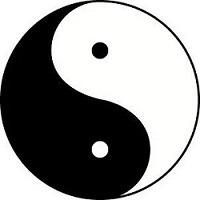
So, instead of it simply foreshadowing a final showdown between the two, perhaps it represents instead how the two are contrasting yet relative and complementary forces – both still independent from one another yet remain interconnected with each another, just like their relationship with the world and within jujutsu society; how it is this harmony and balance with each other that may give rise to both of them and to the other sorcerers aligned with them as they continue to fight for their personal truths: to reset jujutsu society/the world from within (Gojou), and to save those they believe as good and deserving (Megumi).
There are definitely many ways to read into this. Either way, I think we can all agree these covers are just breath-takingly gorgeous. Like, the artbook illustrators and cover designers (Takeji-san and Hiramatsu Tadashi) don’t have to go so hard each and every time, but damn, do they always lol.
#jujutsu kaisen#itadori yuuji#fushiguro megumi#gojou satoru#tldr keysmashing with feels#this has been sitting in my drafts for the week time to set it free lmfao#alternatively since i'm speculating anyway#we can still over-analyze this as Foreshadowing (tm) still#Megumi being drawn inverted → him seemingly going thru a corruption arc/heading to the Dark Side (lol)#→ except pLOT-TWIST! he was pretending to be antagonistic to side with Sukuna and/or Kenjaku…#only to BETRAY them in order to protect Tsumiki Yuuji and his friends… ????#probable? not really. within the realm of possibility bc who knows what goes on in the Cyclop-Cat’s brain?? maybe lol#these are just pretty artworks self#stop over-reading everything for that Deep Jujutsu sYmbOlisM....#tl;dr i'm rambling into the void ignore me#also also who wants to bet for the vol3 cover art#it'd be nobara and maki but facing away from each other#maki on the left as callback to her destroying the zenins#nobara on the right as affirmation of her self#both fighting not against each other but against patriachal expectations of jujutsu society...#or something something...#jjk manga spoilers#meta#q
42 notes
·
View notes
Text
This Week In "Time & Again" #7: And The Wheels Keep Turning
Hallöchen! 👋
Took me a little more time to come back with a new blog post - but here I am, delivering you a new tiny wall of text to read, just as originally intended 😁
Christmas is steadily on its way, and the life is exploding with events, big and small, good and not quite - but mostly good ones; and the jolly festive music is playing all around, and as a certain somebody plays one truly mesmerizing and entertaining Christmas Doom mod in the evenings - of course, with Christmas music in it, too - the work on "Time & Again" goes on and quite well (can't complain; Lothar can't complain either). All's good. In fact, I have only about 3 pages left to finish up The Lineart Stage, although some little parts here and there were skipped previously. But I doubt it it's gonna take me considerable amount of time to make everything 100% complete and to wrap it up (no, not the presents - tis the season, I know, but I meant a different kind of wrapping... y-yeah 😅).
Since time is a valuable resource - which is exactly what one of my absolutely favourite characters in the entire "Time & Again" series once said (hey dear readers, can you guess who I'm talking about?) - I think, for the first time in my life, this once, I'll make a new post very short. Gotta go back to nannying me kids, after all (ah, life of an artistic parent is hard 😫). Don't wanna waste a lot of time distracting myself, especially during this hectic end of the season.
Also, I still got my eggnog to drink. It's on my list of important things to eat/drink. So yup, time is sure valuable!
I was gonna make a special post about the procedures and peculiarities of how I create page templates for "Time & Again" using Inkscape and Krita to create a functional and convenient workspace for myself. But I'll save that for another day, because writing a logically structured and sophisticated post about such a technical topic will require some mental effort. And since currently my mind is preoccupied mainly with blue jays, eggnog, laundry, und Spätzle, this topic might be a tad too exhausting for me to take on right now. So I'll just spam with a few cute panels portraying Lothar - to keep y'all happy 😁
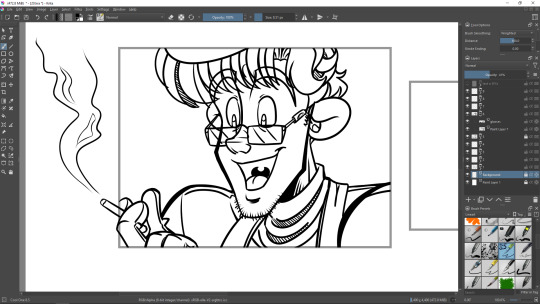
We already talked about Lothar's disgusting habits earlier, we did.
However, cigarette smoke dreamily twirling upwards in the air is something that I really enjoy drawing often outside the outlined boundaries of the comic panels. As you can see on the screenshot above, Lothario is super excited about something in front of him and he absolutely does not notice that the cigarette is sticking out from the panel. And you know? I like that. What you will often see in my graphic novel for sure - and especially in Chapter 5 I'm working on right now, because holy effing ****, is Lothar a heavy smoker! 😱 - I use the smoke outside and sometimes across a few panels, sometimes intertwining the lines and arranging them in such a way that they create a neat effect of interconnection.
It's not only about smoke/aromatics though; I really enjoy drawing hair sticking out from the frames, too. I must admit - your dear creator hasn't read a lot of comics in her life, but you'll have to put up with me 😎 - I do not see this happening in a lot of comics or mangas. Or perhaps I'm just attempting to read the wrong ones all the time 🤪
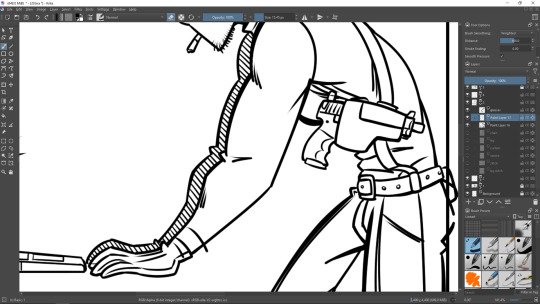
Here's another one peculiarity I really grew really fond of within the last few years. Whenever I draw limbs on the background that are directly behind the limbs on the foreground, I just fill the background one with diagonal strokes. Of course, I do it by hand every time. I did have an idea to automate this and just fill the areas I need with the predefined strokes/crosshatch - luckily, Krita has an amazing function to add a fill layer with a wide variety of parameters of choice. But for such a simple task as illustrated above, I just do it manually all the time. Also, it looks natural and with a slight degree of imperfection - that's just what I need!
And pistols... ugh. Pistols take a certain talent to draw well, too 😁
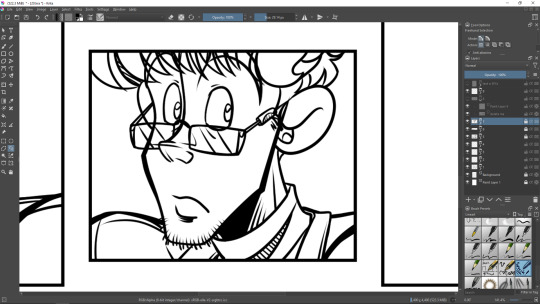
And this... Honestly, why am I even showing this one to you?.. 🤔 Probably because I really like Lothar's face on this picture. Once coloured, it won't disappoint you.
Welp, that's probably enough for a very short post in between sessions of creation and life undertakings.
Aaah, no! Just one more thing - a little but extremely funny animated gif before I go offline to create more stuff! Here you are! 🤣
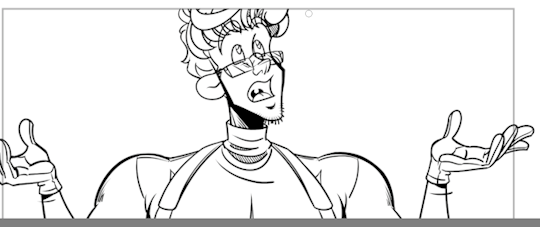
See you next time! Take care! Don't forget to drink some eggnog. 👋
0 notes
Note
I have a theodicy-adjacent question if that's alright. How can I offer prayers of thanksgiving without implying that God "likes me better" than They like other people? For example, I often want to thank God for keeping my loved ones safe through this pandemic, but it feels weird when so many have lost dear ones. I've learned a lot about how to wrestle with God through your ministry, but how to bring your positive feelings to God without toeing the line of a prosperity gospel-esque mindset?
Anon, I feel you! Some point a few years ago I had a similar unsettling realization. I knew that gratitude is important not only for our relationship with God, but for our psychological wellbeing — yet I felt so guilty for thanking God for things i knew others didn’t have. Did attributing the good things in my life to God imply that God wasn’t with those who lacked those good things?
I brought that guilt and discomfort to God (and still do, whenever it arises anew). asked Them to help me sit with it, accept it, and then transform it into something more fruitful.
guilt transformed to motivation. discomfort transformed to commitment. what i was left with was an understanding that i did not need to stop my prayers of thanksgiving, but to expand them.
i take time to really feel and express my gratitude for the abundance i experience. and then i ask God to help my gratitude move me to a desire for others to experience that abundance too. I ask for guidance in how i can help make that abundance happen in the the lives of those around me and far from me.
___
i also make time for lament. many of us are taught how to ask God for things and how to thank God for things, but grief and lament are not taught. however, thanksgiving and lament are not opposites, but work together. they enrich one another. we need to take time for both.
a book that helped me embrace lament was Barbara Brown Taylor’s Learning to Walk in the Dark. You can read quotes and whole passages from it in my tag over here.
one of my favorite songs/psalms to sing/pray in lament is this one. The psalmist empowers us to question God, to ask why and how and when? and then the psalmist leads us to praise God anyway — to praise in spite of and with our doubts and our questions.
when we look at all the pain in the world — in our own lives, the lives of loved ones, the lives of those we don’t even know, and in the struggling pulse of all Creation — we feel all sorts of things. Distress, despair, anger, grief. But some of us are afraid to bring those feelings to God. We’d rather avoid the feelings in general, repress them, not sit inside them for a while. (And certainly, we should not wallow in the bad all the time.) Bt when we dare to assign intentional time to sit in those feelings, God sits in them with us.
And there is a strange thanksgiving in there, too — that we aren’t alone in the lament. We come to see that it is true that God does not will suffering upon any one of us — that the fact that sometimes i experience blessing while you struggle, or you find success while i go without, is not because God is choosing which happy few to bless that day. God really does will abundant life for all, and grieves when sin (individual, systemic, the rot that eats at this world) blocks that abundance for anyone.
___
in continuing to make time to feel and express gratitude, and then to make time to lament and to both desire and participate in abundance for others, thanksgiving does not elevate me above others as “better” or “more blessed” than they are. instead, gratitude reminds me of how interconnected we are with one another. In the Body we all share, “If one member suffers, all the members suffer with it; if one member is honored, all the members rejoice with it” (1 Cor 12:26).
___
When abundance wins out in spite of sin, we rejoice! When it is we who enjoy that abundance, our gratitude should not lead to smugness or self-congratulations, but to humility. it should shape us, move us to bring similar abundance to others.
A book that has really helped me understand that concept is Robin Wall Kimmerer’s Braiding Sweetgrass (which you can read online for free).
Christian texts have told me that the appropriate response to all God’s gifts is gratitude, but it’s Kimmerer’s book that helped me digest and embody just what that means. We acknowledge abundance, and we use that gratitude to connect us to the giver, and to others to whom that giver would also share Their gift.
Here’s one passage from her chapter “The Gift of Strawberries,” starting on page 33 of the webpage linked above:
Even now, after more than fifty Strawberry Moons, finding a patch of wild strawberries still touches me with a sensation of surprise, a feeling of unworthiness and gratitude for the generosity and kindness that comes with an unexpected gift all wrapped in red and green. “Really? For me? Oh, you shouldn’t have.” After fifty years they still raise the question of how to respond to their generosity. Sometimes it feels like a silly question with a very simple answer: eat them.
But I know that someone else has wondered these same things. In our Creation stories the origin of strawberries is important. Skywoman’s beautiful daughter, whom she carried in her womb from Skyworld, grew on the good green earth, loving and loved by all the other beings. But tragedy befell her when she died giving birth to her twins, Flint and Sapling. Heartbroken, Skywoman buried her beloved daughter in the earth. Her final gifts, our most revered plants, grew from her body. The strawberry arose from her heart.
In Potawatomi, the strawberry is ode min, the heart berry. We recognize them as the leaders of the berries, the first to bear fruit.
Strawberries first shaped my view of a world full of gifts simply scattered at your feet. A gift comes to you through no action of your own, free, having moved toward you without your beckoning. It is not a reward; you cannot earn it, or call it to you, or even deserve it. And yet it appears. Your only role is to be open-eyed and present. Gifts exist in a realm of humility and mystery—as with random acts of kindness, we do not know their source.
...Gifts from the earth or from each other establish a particular relationship, an obligation of sorts to give, to receive, and to reciprocate. The field gave to us, we gave to my dad, and we tried to give back to the strawberries. When the berry season was done, the plants would send out slender red runners to make new plants.
Because I was fascinated by the way they would travel over the ground looking for good places to take root, I would weed out little patches of bare ground where the runners touched down. Sure enough, tiny little roots would emerge from the runner and by the end of the season there were even more plants, ready to bloom under the next Strawberry Moon. No person taught us this—the strawberries showed us. Because they had given us a gift, an ongoing relationship opened between us.
...It’s funny how the nature of an object—let’s say a strawberry or a pair of socks—is so changed by the way it has come into your hands, as a gift or as a commodity. The pair of wool socks that I buy at the store, red and gray striped, are warm and cozy. I might feel grateful for the sheep that made the wool and the worker who ran the knitting machine. I hope so. But I have no inherentobligation to those socks as a commodity, as private property. There is no bond beyond the politely exchanged “thank yous” with the clerk. I have paid for them and our reciprocity ended the minute I handed her the money. The exchange ends once parity has been established, an equal exchange. They become my property. I don’t write a thank-you note to JCPenney.
But what if those very same socks, red and gray striped, were knitted by my grandmother and given to me as a gift? That changes everything. A gift creates ongoing relationship. I will write a thank-you note. I will take good care of them and if I am a very gracious grandchild I’ll wear them when she visits even if I don’t like them. When it’s her birthday, I will surely make her a gift in return. As the scholar and writer Lewis Hyde notes, “It is the cardinal
difference between gift and commodity exchange that a gift
establishes a feeling-bond between two people.”
That is the fundamental nature of gifts: they move, and their value increases with their passage. The fields made a gift of berries to us and we made a gift of them to our father. The more something is shared, the greater its value becomes. This is hard to grasp for societies steeped in notions of private property, where others are, by definition, excluded from sharing. Practices such as posting land against trespass, for example, are expected and accepted in a property economy but are unacceptable in an economy where land is seen as a gift to all.
Lewis Hyde wonderfully illustrates this dissonance in his exploration of the “Indian giver.” This expression, used negatively today as a pejorative for someone who gives something and then wants to have it back, actually derives from a fascinating cross- cultural misinterpretation between an indigenous culture operating in a gift economy and a colonial culture predicated on the concept of private property. When gifts were given to the settlers by the Native inhabitants, the recipients understood that they were valuable and were intended to be retained. Giving them away would have been an affront. But the indigenous people understood the value of the gift to be based in reciprocity and would be affronted if the gifts did not circulate back to them.
Many of our ancient teachings counsel that whatever we have been given is supposed to be given away again. From the viewpoint of a private property economy, the “gift” is deemed to be “free” because we obtain it free of charge, at no cost. But in the gift economy, gifts are not free. The essence of the gift is that it creates a set of relationships. The currency of a gift economy is, at its root, reciprocity. In Western thinking, private land is understood to be a “bundle of rights,” whereas in a gift economy property has a “bundle of responsibilities” attached.
...
In material fact, Strawberries belong only to themselves. The exchange relationships we choose determine whether we share them as a common gift or sell them as a private commodity. A great deal rests on that choice.
For the greater part of human history, and in places in the world today, common resources were the rule. But some invented a different story, a social construct in which everything is a commodity to be bought and sold. The market economy story has spread like wildfire, with uneven results for human well-being and devastation for the natural world. But it is just a story we have told ourselves and we are free to tell another, to reclaim the old one.
One of these stories sustains the living systems on which we depend. One of these stories opens the way to living in gratitude and amazement at the richness and generosity of the world. One of these stories asks us to bestow our own gifts in kind, to celebrate our kinship with the world. We can choose. If all the world is a commodity, how poor we grow. When all the world is a gift in motion, how wealthy we become.
#gratitude#prayer tag#prayers of thanksgiving#prayers of lament#thanksgiving#lament#pandemic mention#braiding sweetgrass
79 notes
·
View notes
Text
Awaken the Vampire
F vampire X F human, 6285 words
Descend into an ancient tomb and awake the vampire from her slumber.
The damp air of the cave tickled against your skin. You resisted the urge to shiver. The cavern you had squeezed yourself into pressed tight around your body, so that the tiny stalactites and stalagmites brushed against your skin like a whisper. Using the tips of your toes and fingertips, you pushed yourself further into the passageway. It tightened further the more you moved until you couldn’t get a deep breath for the rocks constricting your ribcage. Thank goodness you weren’t claustrophobic. You would have begin panicking a long time ago.
The tunnel opened up abruptly, widening into a massive chamber. With some more wriggling and struggling, you eased yourself out into the chamber. You flopped down to the floor, squirming until your legs were completely free. Once you were free, you straightened up, clicking your headlamp until the focused beam grew wide enough to light up the area.
A smile spread across your face. It probably looked feral in the dim lighting of the cave, but you didn’t care. Two weeks of searching through the tight, dangerous underground spaces, and you had finally managed to find it.
The Reksali Tomb. The cavern smelled damp and mildewy and your shoes squelched as you walked across the room. A thin layer of some lichen-like material covered the walls. Tentatively, you brushed some of it away with a gloved hand. Underneath the slime, gold traces were set into the wall. Stylized images of humans and animals chased each other around the walls, depicting a story complicated enough that you couldn’t quite follow it. But the illustrations truly confirmed it: there was nothing else it could be. The Reksali Tomb.
Your gaze shifted to the center of the room. The floor was covered in slippery lichen just like the walls, turning the objects in the tomb into rounded lumps. But you could guess what the large, rectangular structure in the middle of the room was. Clicking your flashlight back to a more narrowed beam, you approached.
The lichen was thickest over the coffin. Even through your gloves, you could feel how ice-cold the metal coffin was. It almost burned. You shivered as you brushed the plant matter off. It gathered on the ground at your feet, heavy and damp.
Underneath the lichen, the coffin was almost pitch black, as reflective as obsidian, with gold markings embossed on it. There were several stylized images etched into it, along with striking gold lines that you figured made up a long-forgotten language.
It took several minutes to fully uncover the coffin. The entire thing was designed like a giant box, with a lid settled neatly into place, then sealed with some kind of melted metal barrier around the crack. After a few quick strikes with a nearby rock, a small section of the metal barrier crumbled and you were able to pick your way along the border.
The coffin seemed to get hotter the more metal you picked off. By the halfway point, it felt as warm as a living body. By the time you were nearly done, it was almost burning under your hands.
As the last of the metal flaked away under your fingertips, the coffin grew blazingly hot. Even with your hands an inch away from the surface, you could feel your fingers burning. You retreated a few paces. The air around the coffin shimmered with heat.
Slowly, the metal of the coffin began to warp. It softened, like block of chocolate held over flame, and began to twist inward. Thin rivulets of liquid metal dribbled from the box, dripping to the floor in a puddle.
You backed further away as the coffin crumbled in on itself. The metal warped and twisted. After only a few moments, it had melted away to only a few chunks of softened metal in a night-black puddle.
The oppressive heat faded. Cautiously, you approached what remained of the coffin. Where the metal box had once sat, there was a wooden case. It was long and rectangular, big enough to hold a thin person inside. Strange symbols were carved across it, several of them resembling stylized suns or holy symbols.
You tentatively pressed your fingers to it, running them across the wood. It was rough, almost raw. You drew your hand along the largest carved symbol of a sun, toward the top of the coffin, then winced. A large splinter had broken off and lodged itself in your finger. You yanked it out, grimacing as a bright bead of blood welled up and dripped down onto the box below.
The instant the blood touched the wooden surface, there was a faint sizzling noise. The droplet of blood sank into the carved images, dying the wood a deep red. The red spread through the interconnected carvings, dying far more than a single drop of your blood should have been able to. The box began to tremble.
Something scratched at the inside of the box with horrible scraping noise. Again and again, more furiously each time, the scratching sounded. The box thumped and rattled, wobbling on the spot. You took a cautious step back.
The wood of the box squealed as the scratching finally pierced through the top of the box. You felt your back press against the cold stone wall as the lid splintered.
For a moment, there was silence. The lid lay in shreds next to the box. You took a cautious step toward it, then another cautious step. Your light wavered, trembling with the shaking of your body.
And then, slowly, cautiously, a hand clutched at the side of the box. You stopped moving. Your breath stilled in your chest.
The hand was almost human-like, but the fingers were too long and tipped in massive claws, and there was something membranous stretching between them. It adjusted its grip on the box once more, then heaved itself up and out.
The owner of the hand was tall and unnaturally skinny, like she had been stretched on a rack. She wore some sort of tattered, off-white robe that covered most of her body, but it revealed enough to show that she was clearly not human. Her legs were jointed strangely, like she was balancing on her toes. Enormous, curved claws that reminded you of a velociraptor’s clicked against the floor as she moved. When she stretched out her arms, you could see a thin, membrane of skin stretching between her arms and sides. Her ears were long and pointed, twitching and rotating at the slightest noise. Her eyes gleamed in the dark, reflecting the light from your torch. Sharp fangs protruded from her mouth. She pulled her lips back from her teeth, making soft, guttural noises.
You held as still as possible. Your breath kept catching in your chest. The woman didn’t seem to be focusing on you. She swung her head back and forth, examining the room. Her nose twitched as she sniffed the air.
Slowly, so terribly slowly, you took a single step backward. Your foot came in contact with a tiny rock. It clattered across the stony ground, smacking a wall before coming to a complete stop.
Her head snapped in your direction. You could see her pupils contract in the glare of your light. For a long moment, you stared at each other. Your heart pounded in your chest, constricting your breathing. Tentatively, the woman shifted her weight forward, like she was about to pounce.
The tense cord between you snapped. Without even a second of thought, you turned and bolted.
You made it a couple of feet before something crashed down on your back, knocking you to the ground. You sprawled, your chin smacking against the ground. The tang of blood filled your mouth as it welled from your cut tongue.
The weight on your back shifted. You could feel claws digging into your shoulders. The woman made a clicking, hissing noise. She snuffled at your shoulders. You froze.
“You freed me.” It took you a moment to register the sounds she was making as words. They had the rasping, rusty quality of a voice not used in many, many years. A faint flicker of relief started in your chest. If she could speak, she was probably intelligent. If she was intelligent, maybe her first instinct wasn’t going to be to rip you to shreds.
Her grip on your shoulders loosened. “Who are you?” she asked. It was hard to tell, thanks to her disused voice, if she was curious or angry.
You had to swallow a few times to lubricate your dry throat. “I- I’m an explorer! An- and archaeologist!” There was silence. You really wished you could see her face. How long had she been in there? Had she even heard of those things. “I- I study ancient cultures! There was supposed to be some sort of tomb here so I was looking for it!”
“Ancient cultures,” the woman repeated. Her voice was starting to become more emotional. You thought she sounded speculative. “How long have I been in this tomb?”
You hurriedly picked through your knowledge of the tomb. “A- a thousand years or so? That’s how long the tomb’s been sealed for.”
The woman leaned back. She was still crouching over you, but her hands were no longer on your shoulders. “A thousand years,” she repeated. You made an effort to shift underneath her, but her skinny frame was a lot heavier than you expected. You couldn’t shove her off.
“You are the one who freed me.” Her hand came down on your shoulder again. There was a bright prickle of sensation as her claws pressed against your skin. You swallowed hard. A bead of sweat trickled down your forehead.
“I- I am,” you said. Was that good? Bad? You had no idea why she’d been sealed away in the first place. Perhaps she’d be grateful. Perhaps she didn’t care, and she would rip your throat out and drink your blood before starting on a campaign to end the world.
“Hm.” The woman made a small, noncommittal noise. Her claws tightened ever so slightly on your shoulder. You tried not to make a single sound, despite the prickling pain. “After a thousand years, one has come and freed me.” It sounded like she was talking more to herself than to you. You decided just not to say anything. Abruptly, she swung off your back and rose to her full height. “Rise.”
On shaking knees, you stood. She was taller than you’d expected. Your head only came up to about her collarbone. Up close, there was something stark and terrifying in her features, yet also terribly attractive. The snarl of her upturned lip and the glow of her narrow, yellow eyes made your heart pound with something other than fear.
One of her hands came out and slid under your chin. She peered into your face, tilting your head one way and another. “A mortal?” she asked. “Not a mage?”
“No,” you said. Your throat bobbed in a quick swallow. “I- I’ve never met a mage before. They’re, uh. Uncommon.” Uncommon was putting it lightly. True magicians were probably ten thousand to one, and that was a liberal estimate.
The woman’s chest rose and fell slowly with her breathing. The only sign that she was even slightly perturbed was the slight twitch of her ear. “I see,” she said. “Interesting.” She flexed her wings, the membrane twitching as she moved. “Very well then. Lead the way.”
You blinked. “Er. I’m sorry?”
The woman gave you an impatient look. “Lead me out. You freed me from the tomb. Now lead me from this cavern.”
You paused. Was that even a good idea? She had probably been sealed away for a reason. Was it safe to lead her out?
As you were pondering, the woman took a step closer and glared down at you. Her yellow eyes flashed. “Go.” It was only one word, but it radiated through your veins and set your bones trembling. Fuck. You felt suddenly very sure that if you refused, she would rip your throat out and start clawing her way up through the roof. It would take longer, but she would manage it.
“Okay. All right. It’s kind of tight. You’re going to have to crawl.” Turning your back on her felt like a bad idea, but, then again, you probably couldn’t stop her if she wanted to attack while you were facing her. Carefully, you pressed yourself back into the tunnel.
After you made it a few feet forward, you were aware of the woman scurrying along after you. Every now and then, you could feel her touch one of your feet or brush up against you from behind.
It took some time of wriggling through small tunnels and walking through larger caverns, but you eventually made it out of the cave. It had passed into night in the time you’d been inside. There was the faintest strip of orange sunlight at the edge of the horizon, but the rest of the sky was dark and glinting with starlight.
The woman scrambled out of the tunnel. She looked around wildly, ears swirling and swiveling. Her gaze lifted to the sky and her body went slack. For the first time, she looked genuinely uncertain.
“What happened to the stars?” Her voice lost, confused.
You looked up at the sky. The sky was covered in a smattering of stars, some bigger than others. Only a thin glimmer of moonlight came from the narrow crescent, allowing even some of the fainter stars to be seen. “Nothing’s happened to them, I think. There might be a couple clouds out, but other than that, it’s a pretty good viewing night.”
The woman pulled her lips back from her teeth and gave an impressive snarl. “This is good viewing? There’s barely any!” She gestured broadly at the sky. “There should be far more of them! What happened?”
Several facts clicked together in your head at once and you sucked in a deep breath. “Oh. Right. There’s a lot more light pollution than there was a thousand years ago, I guess.”
The woman glared at you. “Light pollution?” Her voice indicated that she was right on the edge of her patience.
“It’s hard to explain,” you said. “Oh, hold on- I can show you.”
The cave was set into a hilly landscape, so it only took a few minutes of walking to find an overlook spot. Given that it was night, the town was easy to see, a riot of light against the dark hillside.
The woman was silent for a few moments. “That’s light pollution,” you said, gesturing to it. “There’s so much artificial light, the stars aren’t bright enough to be seen anymore.”
“Artificial light,” the woman repeated. “Like the light in your lamp?”
You removed your helmet from your head and held it out. “Yeah, it’s similar. Those lights are bigger, though.”
The woman took the helmet in her hands, turning it over. “Hm.” She flicked the light on and off a few times. “These are common?”
“Yeah. They’re everywhere. Have been for a while now,” you said.
“A while,” the woman repeated. It took you a moment to catch her drift- a while could mean just about anything to someone who had been locked in a box for a thousand years.
“Uh. Like, a hundred years? At least?” When had light bulbs been invented anyway? You reached into your pocket and fished out your phone.
The woman pounced on you, eyes wide. “What is that?”
“My phone,” you said, then immediately realized that wasn’t going to be enough information. “It’s, uh. Like a device that can give me information and let me contact other people.” The woman stared at you for a moment, then snatched the phone from your fingers. “Hey!” You made a motion to snatch it back, but she dodged you with ease. Her claws clacked against the screen for a few seconds before thrusting it back at you.
“It isn’t working.” She bared her teeth.
“Yeah, you need to use the pads of your fingers. What did you want to know, anyway?”
The woman shuffled closer to you to look over your shoulder. She was close enough that you could smell her. You expected it to be unpleasant, but it was strangely dusty and pleasant, like the sort of smell coming off an old book. “What has happened since I have been sealed away?”
“That’s a thousand years,” you said, trying to keep your voice gentle. “A lot has happened. We might need to, uh. Narrow the range a little.” The woman stared at you blankly. “Uh. Okay. Let’s try this. I have questions about you and you have questions about me. So how about we ask each other questions. One at a time. I ask one and then you answer and ask a question. We’ll go back and forth.”
The woman looked at you for a long moment. One of her ears twitched over and over. “Fine,” she said, drawing herself up. “I will go first.” You shrugged . At least she was playing along.
There was a beat of silence while the woman considered her questions. Finally, she said, “What year is it, precisely? I know it has been around a thousand years, but I would like to know specifics.”
“It’s 2021.” An easy first question. The woman’s face twisted with confusion, but she didn’t say anything else. You pushed forward. “Why were you in that box?”
The woman snorted and shifted her wings with a noise like rustling leather. “The locals and I had a disagreement.” You opened your mouth to press for more details, but she silenced you with a glare. “It is my turn now.” She tilted her head back and sniffed the air. Her nose wrinkled slightly. “What is that smell?”
You sniffed, but the air smelled perfectly normal to you. Slightly damp, because there were storm clouds gathering to the west, but other than that, it smelled fine. “I don’t smell anything.”
The woman gave you an irritated look. “Humans. Your senses are truly pathetic. It is embarrassing that I was sealed away by your kind.”
“Considering that we managed it, I think it’s safe to say we’re good for something,” you said. The woman rolled her eyes and sniffed at the air once more, her nose wrinkling in disgust.
“It smells foul,” she said finally. “Like smoke, but far worse.”
“Oh. It’s probably a lot of things, then. Car exhaust, likely, and maybe some other burning stuff. There’s a highway not too far from here, so you might be smelling something from that? And maybe you’re smelling gasoline or something.”
The woman looked confused for a moment before she schooled in her expression. “Hmph. Humans are always doing strange things.”
“What kind of disagreement did you and the locals have?” you asked. The woman gave a little snarl of irritation.
“I fed on them.” She said it as simply as if she were confessing to stealing a few apples or sheets of fabric. “I was hungry and I did not expect them to fight back.” She shuffled her wings. “I killed none of them, but they interpreted me as a threat nonetheless. In secret, they built that box and sealed me in with magic. Until, of course, you came and released me.”
“You fed on them,” you said slowly.
“Their blood.” The woman shrugged. “I am what I believe you refer to as a vampire.”
“Explains how you were able to survive so long in a box,” you muttered. Vampires were able to hibernate for exceedingly long periods of time, though about a thousand years was truly impressive.
“Yes. They were far more interested in sealing me away than killing me. Fortunate for them. Vampires are terribly hard to kill, and if they had not used sealing magic, I would have certainly destroyed them.” The vampire woman gave a sniff. “Perhaps they only intended to seal me away for some time to weaken me and planned on destroying me later, only to be destroyed themselves. I am uncertain. Regardless.” She flexed her wings and gave a sharp-toothed smile. “I survived and they did not.”
Something in her expression made your heart race. It was wild, powerful, and it thrummed something deep in your core. “You did. That is impressive.”
“Impressive indeed,” the woman said. She shook her head. “This questioning game is done. I am now back to myself and back in my home. I need to reestablish my territory.” She flexed her wings, spreading them to full length. “I thank you for your service to me. We shall meet again.”
You opened your mouth to say something else, but the woman had already taken off. Her enormous wings spread and she jumped an impressive height. As she started to fall, her wings caught the air. She swooped upward, rapidly turning into a dark spot against the great paleness of the moon.
A prickling uncertainty crept up the back of your neck. You couldn’t shake the feeling that you had maybe unleashed something dangerous.
The next few days were largely uneventful. In fact, they were uneventful enough that you started to doubt that you actually had released some kind of vampire from an ancient tomb. Maybe it had been some weird kind of fever dream?
And then the reports started to come in.
It was mostly about alien attacks. Cow mutilations had always been associated with aliens, and there were mentions of something strange in the attacks, but you didn’t pay it much mind. People were always finding something odd relating to aliens. But then the reports became more frequent and you realized that the strange factor in the attacks was that the cow carcasses would often turn up uneaten, but half-drained of blood.
You tried to ignore it. They were cows, after all. They were going to get eaten anyway. And maybe it was some kind of strange, coincidental animal attack.
When people started to report having their blood taken, then you started to get really concerned.
No one had died, which was something of a relief, but the reports were starting to stack up. All of them had the same basic elements: the person would wake up in the middle of the night to a stinging pain. Often, they felt sluggish and slow, barely able to move. When they managed to touch the painful location, there was a patch of raw skin, as if it had been rasped away by something like sandpaper. Blood dripped freely down onto their bed. Most of the time, they couldn’t move enough to look at the thing that had attacked them, but there had been a few lying in a good enough position to see their window. They were able to see it as a strange creature, like a woman, but also quite a lot like a bat, crawled out of their house and soared away.
The word ‘vampire’ was getting tossed around a lot.
You weren’t sure why you decided to go back to the woods to look for her. There was a strong chance that she would just attack you, and it was also possible that you just wouldn’t be able to find her. But you had to do something.
It was nearly midnight when you arrived in the woods you’d last seen her. You fumbled quickly through the undergrowth, your flashlight bobbing wildly over the foliage.
“Hey!” Your voice seemed unnaturally loud in the quiet of the forest. It was weirdly quiet. Weren’t there usually animals out at night? “Hey! Uh.” Damn, you hadn’t gotten her name. “Look, I want to talk! I freed you from the box, the least you can do is-”
Something behind you snapped loudly. You gave an undignified shriek and tripped over your own feet. A bush crumpled underneath you, sharp branches poking at your back as you collapsed on top of it.
Raking, high-pitched laughter echoed from the same direction of the twig snap. “Humans are delightfully funny,” the woman said. She stepped carefully into the beam of your flashlight. “You are looking for me?”
“Yes.” You scrambled back to your feet, brushing the twigs and leaves off your outfit. “We need to talk.”
The woman looked incredibly amused at that statement. “Do we?” She smiled. It wasn’t quite a pleasant smile, but it wasn’t quite mean either. That was somewhat encouraging. “By all means, speak your mind.”
You took in a deep breath. There was no reason to dance around the topic. “Are you drinking people’s blood?”
She lifted her eyebrows slowly and made a derisive snorting noise. “Yes. Did you think I wasn’t going to?”
You hesitated. “You can’t just grab people and drink their blood.”
“Why not? It’s hardly as though I killed anyone. I am a vampire, after all. I drink blood.”
“You’re going to get yourself sealed away again,” you said. “Or worse, shot. One of these nights, you’ll break into the house of someone who has a gun, and then what’s going to happen to you?”
The woman lifted her eyebrows higher, though this time she looked a little amused. “Then you have come here to warn me? For my own safety?” She drifted closer to you. Her eyes gleamed in the moonlight. “How very touching.”
You didn’t back away. “I released you. That means I have some responsibility for both what you do, and for you. If you get shot or if someone gets really hurt while you’re hunting, that’s going to be on my hands too.”
The woman stepped even closer to you. She was taller than you, and so close that a few strands of her hair, blowing gently in the breeze, tickled the side of your face. “So, you are taking responsibility for me, are you? Are you volunteering to feed me, then?”
Her question sent a sharp spike of fear through your chest, but you looked levelly back at her. “Yes.”
The surprise on her face was satisfying. She went blank and wide-eyed with shock for a moment before her expression was schooled back into its usual aloof state. “Truly,” she said. A faint hint of amusement curled around her words. “Well. I am hungry now.”
She was expecting you to back down. You could see it in her face. She thought you were going to turn tail and run. You squared your shoulders. “Then I am at your disposal.”
The woman stared at you for a long moment. The only sound was the soft breeze rustling through the trees. Then her face split into a sharp-toothed smile. “Very well, then. Hold still.”
There was a slight trembling in your knees as the woman stepped forward and put her hands on your shoulders. “Hold still,” she said. Her voice vibrated through your body, making the shivering worse. “This will only hurt for a moment.”
She bent her head down to your neck. For a moment, you felt her soft breath against your skin. Her lips were right there, testing for the right spot.
And then she rasped her tongue and teeth against your neck and there was a flash of bright-sharp pain. It didn’t feel like the pinch of a needle prick. It felt like sandpaper, like sandpaper made of glass, rasping against your skin over and over until blood welled and dripped down your neck.
As she continued drinking, the pain started to change. The area she was drinking from tingled with sensitivity. Her tongue rasped over it again and again, sending you shivering every time she touched it. It was oddly pleasurable. The nuzzle of her nose against her neck as she pressed her head closer was almost sensual. You were practically leaning into her rasping tongue, her lips as she kissed blood away from the wound.
All too suddenly, she was pulling away. Her long tongue slipped out of her mouth, smearing away the blood. There was still some red clinging to her lips, like a bright splash of lipstick.
“Hm. Interesting.” Her voice sounded richer in your ears, all of a sudden. “I really did think you would run.”
“I don’t back down,” you said. Your voice wavered a little. “I said I would take responsibility and I will.”
The woman laughed. “What an interesting little human you are,” she said. “You would truly offer yourself to me? You want to be responsible for me?”
Your head was a little fuzzy, but you focused on her and nodded. “Yes. I want that.”
The woman smiled, all sharp teeth again. Her ears twitched in the slight breeze. “Very well. I certainly won’t deny you your desires.”
With that enigmatic statement, she pulled away from you, her wings stretching out to their full length. Before you could say anything, she lunged into the treetops. There was a momentary rustling and then she was gone.
Tentatively, you lifted your fingertips to your neck. The spot she’d drunken from was tender and smeared with dried blood, but your fingers came away clean. Huh. Had she healed it on purpose or had all her other bite victims healed so quickly? Either way, you were grateful that you didn’t have to meander through the forest dripping blood all over everything. After taking a moment to collect yourself, you walked back to your car.
Your apartment was still and silent, almost creepy, when you returned home. Still, you didn’t take too long to consider the atmosphere. You were bone-tired. After changing your shirt, which was stained with blood, and washing off the dried blood on your neck, you went face first into bed.
You woke to bright sunlight streaming in through your window. Your mouth was dry as a desert and tasted weird. Groaning, you shoved yourself out of bed and shuffled down to the kitchen. Your eyes were barely adjusted to the dim lighting of your apartment, so you located a glass and filled it with water mostly through muscle memory.
Wait. Why was your apartment dim? You had windows, and the sun was clearly up. It shouldn’t have been that dark. Slowly, you turned away from the sink to peer into your living room.
There was no dividing wall between your kitchen and the living room, which meant could very clearly see the extent of what had happened. The room was dim because your windows had been completely blocked out. Someone had hung blankets over the windows, blotting out any sunlight. From what you could see, the blankets were secured on all sides, making sure that not even a single ray of sun could invade the room.
It wasn’t much of a mystery who would have done something like that, because the culprit was hanging upside down in the middle of your living room.
You couldn’t make out any of her features, given that she was wrapped like a cocooned caterpillar. Thin, leathery sheets covered her body, giving her the exact appearance of a hanging bat. Still, it wasn’t terribly hard to make out who it was. How many other bat people did you know?
“Hey!” Your irritation temporarily overcame any wariness you might have had. “What are you doing here?”
The hanging bundle shifted and twitched. In a smooth motion, she unfurled her wings. At their full length, they brushed the walls on either side of her. She looked distinctly unhappy with being roused. “You spoke boldly of taking on responsibility for me,” she said. “Have you already grown unhappy with our arrangement?”
You folded your arms over your chest. “I didn’t say I was going to let you live with me!”
The woman shrugged, her wings rippling with the motion. “It is common for acolytes to allow their patron a place to rest. I assumed you understood what you were offering.”
You tried to sort through your conversation. Well, you had offered to take on responsibility for her. You could see where she’d gotten the idea. “I wasn’t really intending to get a roommate out of this,” you said, more to yourself than anything.
There was a thump and the rustling of leathery wings as the woman removed herself from your ceiling. She was taller than you, and you had to crane your neck back to look up into her face.
“Fear not,” she said. She was smiling, showing off her sharp teeth. “I do not leave those devoted to me with no recompense. Your service shall be rewarded.”
“Uh, huh,” you said. There was something lascivious in her voice. “Uh. Well. I mean, I suppose if you have nowhere else to go, you can stay. But try not to draw any vampire hunters back here, all right? I can’t fight them off for you.”
It had been sort of a joke, and the woman smiled at it. “I shall endeavor not to harm my acolyte,” she said. You weren’t sure you liked that new nickname, but it wasn’t worth arguing. Grumbling, you marched back to your room and promptly collapsed on your bed. You had been through entirely too much for one day.
And that was how you ended up with a vampire for a roommate.
All in all, it could have been far worse. She was mostly dormant during the day, only going out once the sun had set. Mostly, you just had to avoid her when she hung upside-down from the ceiling of your living room.
It was a couple weeks after she had moved in that you noticed the strangeness. It was all small things at first, an unusual raise in your paycheck, then people casually stopping you and offering volunteer work for little odd jobs you needed done. Your shower broke and less than a day later, you had someone offering to fix it for free.
You didn’t give it much mind. It was strange, but not concerning. Maybe you were just having an unusual string of good luck. That is, until you realized that your string of good luck had started right when you’d started living with a vampire.
It was a routine, by that point, to sit in the kitchen and eat dinner as she woke up, so you basically set an ambush. When she started flexing her wings and shifting around, you pounced.
“Hey.” You’d spent several hours trying to come up with some good way to ask her your question, but hadn’t been able to come up with anything better than, “Are you doing something to the town?”
She yawned and gave you an irritated, upside-down look. “Could you be more specific?”
“Weird things have been happening lately,” you said. “People are being, like, weirdly nice to me.”
She snickered. “You are so disliked by the town’s residents that you assume their taking a liking to you is my doing?”
When she put it like that, it sounded like paranoia talking. But you did feel like it was strange. You stood your ground. “You know what I’m talking about.”
Her expression grew slightly more serious. “I do.” Slowly, she descended from the ceiling so she could stand over you. “Vampires extend a range of psychic influence over the minds around them. It is subtle, but present. It makes people more malleable, more trusting of me, and of those associated with me. As my acolyte, you will find people much more trusting and desirous of helping you.”
You stared at her. “You’re messing with their minds?”
She shrugged. “Unintentionally. It is not something I actively control. It is a passive action.”
You drew back from her. “Are you messing with my mind?”
Your obvious discomfort shifted something in her expression. Her lips tightened and, for a moment, you though that she looked actually upset that you were afraid. “No. You awoke me. You have been inoculated to the effects of my mind. All your actions are entirely their own. So are theirs, incidentally. It is not mind control. They merely feel more comfortable around me, and around you.”
“Huh.” The moral implications were troubling, but it at least didn’t seem like it was dangerous. “I suppose if you’re not directly mind controlling anyone, it’s okay.”
“Your moral flexibility is impressive,” she said. She flexed her wings. “Shall I take my leave now?”
“Where do you go every night?” you asked. “You’re not feeding on people anymore, are you?”
She rolled her eyes. “I keep my bargains, little human. No. I secure our territory.”
“Our territory?” you repeated.
“All vampires maintain a patch of territory. As my acolyte, or, more accurately, my partner, you have a claim to the territory. I will drive off other vampires from this land while you keep me sated. It is a fair trade, no?”
“I suppose,” you said. “You said I’m your partner?”
“It is common for this partnership to take place between a vampire and a human who are in a romantic relationship.” Were you imagining the sudden anxiety in her posture? “I did not wish to tell you sooner lest you become uncomfortable with our arrangement. But-”
Your kiss was completely on impulse. Her sharp teeth prickled against your lower lip as she stiffened, then relaxed into it. You broke apart to breathe and she smiled, all cockiness and bravado. “I was correct to choose you, my brave little human.”
“I think I’m the one who woke you up,” you said. The vampire shrugged.
“Perhaps I allowed you to find me.” She stepped back as you moved in for another kiss, a teasing smile on her mouth. “Come. We will secure our territory.” She turned, allowing you to clamber onto her back. “And then we can have some fun.”
134 notes
·
View notes
Text
bird primary (system in progress) + burnt badger secondary (really loud bird model)
Howdy! I’m still trying to figure out my own houses and was wondering if you could provide some insight. I haven’t exactly mastered the system so I don’t know how accurate/inaccurate my claims are, so bear with me.
The “why”/Primary: I am extremely motivated by knowledge. I want to know things, not just out of intrinsic curiosity (though that does play a role), but because knowing why things work helps me protect myself more effectively.
One of the trickiest things about this system is separating motivation from method. Because yeah, they are related, but they're also really different. Like this example: "I protect myself by learning things." That's a how, that's secondary stuff. (Bird secondary of course.)
A recent example is this— a group of my former friends all ditched me because I discussed a heavily stigmatized mental disorder that I show symptoms of. And my first response (other than bawling) was to ask them why. And when I got the answer, I was hurt, but I understood. I don’t say this for you to show me pity, but rather because it illustrates this model in action.
This is a really interesting example. Your friends acted in a way that emotionally hurt you. First you processed your feelings (which you talk about in a dismissive, lighthearted, jokey way) then you asked them for more information... which hurt you, but also made you more secure. This is very Bird primary. You feel feelings, but they're whatever. What actually bothers you is not having the data.
(I suspect you're going to end up being a Double Bird. And Double Birds are unique in that their morality and problem-solving are SO interconnected, that they think I'm crazy for saying that for most people, they are in fact two very different things.)
When I got the why and processed my emotions, I cut off ties and realized that their severe judgy-ness had hindered my life for 2 years. And now that I know the “why”, I won’t bring up said disorder again until I know it’s safe. It might never be, but I still have hope.
You updated your system, and you cut away the parts that aren't serving you anymore. Bird primary.
Morally-speaking, I am very sensitive to the views of others around me.
External primary.
I’m not proud of this. In fact, it’s a detriment.
A lot of Birds feel this way. It's a big part of why they tend to like Lion primaries. Lions are much more able to dismiss things with "sounds like that's a them problem."
I won’t go into details, but my parents are… bad. Not wholly, but they are bad. I’ve tried for years, and still do, to escape their opinions because I know it’ll influence mine.
Parents are sticky. They do that. I've been a happily UnBurnt Lion primary for a while now... but I still sometimes hear that voice in my head that sounds like my mother.
And, much like them, I tend to get over-passionate in what I stand for. Unlike them, I’m willing to change if evidence supports this change. I always, however, carry the burden of my former hatred. I always feel guilt over my old beliefs. Even if I’ve changed, the pain I’ve done can never be reversed. And this guilt eats me alive, this shame of being fundamentally wrong.
Okay. You got really emotional on me really quickly here. This could mean a couple things. Your parents sound like fairly toxic Idealists, either Exploded Lions or Exploded Birds (I'm sort of leaning Lion due to the more emotion-heavy words like "passion" and "hatred.") Birds can feel bad, feel guilt, feel shame when looking back at an older version of themselves that they now consider morally repugnant. (Birds are human.) Idealists struggle with the angst of worrying that they are fundamentally wrong about the world. So you could be a guilty Bird, especially if your emotions feel wrong or unhelpful somehow. But you could also be a very Burnt Lion modeling Bird - because Bird seems safer, and you don't want to be a Lion the way your parents are.
When the friend-event happened, I thought that I was in the wrong, and that I had once again fucked myself over because of my passion and sureness in what I have.
"I thought I was wrong because I was acting like an Exploded Lion primary." Yeah, I'm thinking there's some sort of outside influence here that needs to be unpacked.
It took a lot of convincing and evidence for me to see that they were the assholes (albeit I wasn’t pure either— I was their friend, after all).
I'm definitely leaning Bird for you. A bird surrounded by Lions maybe, who sometimes uses Lion terminology. But Bird.
I am a planner and system-lover at heart. I’m not proud of it, but it’s just part of me.
What's with all this negative language? Being a planner and a system-lover is a wonderful thing to be. There's some Burning here.
The caveat— I have autism, so I’m not sure if it’s due to that or not. Hence the shortness of this section. Take it as you will, regardless of if it’s evidence or not.
I have autism and I'm a Lion Badger. People are different. The only real pattern I've observed is the way nerodivergent people disproportionately build Bird secondaries as coping strategies.
Honesty is maybe not the best policy, it’s still an admirable one. I wish, frankly, that my moral system was more honest. I feel like I have no set morals. That it all comes from elsewhere. Lion primaries have this set, intrinsic morality that I envy. My friend is a lion primary, and while my views have radically changed, hers haven’t inched. She’s always been honest about herself and what she holds true.
I'm doubling down on Bird primary for you. This is the perspective of a Bird looking in on a Lion. Lion morality isn't set or intrinsic - it's built, and it changes, but it builds and changes differently than a Bird's does (more slowly, usually). But there really is a pattern of Birds seeing it as more moral/easier/better.
And I’m still trying to figure out what “truth” means to me. I mean, yes, I’m a dry and blunt asshole, but that’s not really the same as gut morality. Internal honesty is what I want, and external honesty is what I have to some extent.
It sounds that you are going though a lot of very intense shifts in your life right now. You've got a diagnosis that has you questioning your place in the world. You've followed your parent's system all you life, and are now deciding that you don't want that. But now comes deciding what you do want, and that's a lot harder (especially for a Bird, who has to build it from the ground up.) You like the way Lions do things, but Lion primaries do not feel accessible.
I’m very clear with who I like. I can admit their faults, and even get annoyed or angry at them, but not even betrayal can stop me from loving them. I’d compare myself to the Twelfth Doctor from “Doctor Who” and Ponyboy Curtis from The Outsiders in that regard.
So maybe you are building a system with very Snake values.
Loyalty is one of my weaknesses. I get overly-attached to people, and so if/when they leave me, it shatters my world. But my brand of loyalty is mostly to people, not philosophical ideas.
... but you're not *really* comfortable with Snake either, if you consider it to be a "weakness."
I would consider myself somewhat philosophical (well, as much as a fucking teenager can be)
Teenagers are *extremely* philosophical, stop being so down on yourself.
but I can be somewhat vague in my beliefs.
Because you're still building them, give yourself a *second.*
If I were to rate the likelihood of what primary I think I am, it’s something like this:
Bird: 9/10 probability (maybe burned)
Snake: 7/10 probability
Badger: 6/10 probability (maybe burned)
Lion: 2/10 probability
What is it with Birds and numbered lists?
The “how”: I feel like I change in order to fit in. I mean, to some extent, we all do, but it’s far more drastic for me. With the lion primary friend, I act as a “Jason Todd” to their Batman. I challenge them, egg them on, crack jokes and become violently passionate and act like a nerd, and she simply watches, usually adding her own comments but mostly sitting on the sidelines by choice. We also joke that I’m the Ferris Bueller to their Cameron Frye. But, with another friend, I’m a parent figure. I listen most of the time, and sometimes jump in with creative ideas and we talk for hours about it.
I'm guessing Actor Bird, both because you can specifically list out the qualities that you "act" out. And because you're invoking and basing your performance off specific [fictional] characters. Which is a HUGE Actor Bird thing.
I go with the flow of a given situation as best as I can (with the added caveat of being autistic, because that does affect how well I can read a room). However, that’s where the adaptation ends.
Huh. I'm hearing Burnt secondary language here. "I'd like to go with the flow and read the room - but I can't, because I'm autistic." You can definitely *learn* how to read a room. Why do you think I'm so interested in (and good at :) personality systems? This is how I learned to use my Courtier Badger. I used to model Bird secondary like crazy, and I kind of don't bother anymore. I don't need the training wheels.
Planning: like I stated before, I’m a planner. I try to learn the most about a situation before jumping in. Sometimes, however, I stall the inevitable and miss my chance, so I jump in and wind up nearly drowning. And this dichotomy repeats. I overcompensate for a lack of knowledge in a situation by micromanaging, or I wind up sitting bored when I’ve already done everything I need to do. And yes, stress and boredom are equally as destructive for me. I try so hard to plan to avoid both of these outcomes, but it only works half the time. So, I guess I’m a bit of a “planster” overall.
I want to learn about a situation... but sometimes I "stall" or "drown" (Burnt language.) But planning also leads to "micromanaging" and "getting bored" (model language.) I think you've got a really loud Bird secondary model... but there might be something else underneath.
Collecting things is fun. Postcards, candles, lighters, crystals, rocks, 1940s hats, knowledge, stories, music, (original) characters, the list goes on. I’m a collector of whatever I can get my hands on. Hell, by this point, I can’t tell what’s my special interest and what I just enjoy (again, autism).
Oh my goodness gracious 'my special interest' and 'what I enjoy' are not two different categories!
But my systems and collections are my coping.
Figured.
I can’t say, though, that they hold any weight outside of emotional release. There’s nothing practical about knowing how they shot The Outsiders movie, or how crows have a flat tail and ravens have two main sections on theirs. All of this knowledge almost feels useless to me. I mean, sure, I’m great at school, but what else? Nothing, it seems like. And being good at school and nothing else makes a person go crazy when they can’t achieve their academic goals. But that’s a bit besides the point— I’m a collector, but I’m unsure how well this really fits into a secondary beyond a model.
Bird secondary model.
I invest in others more than I care to admit.
Oh man, are you a Badger secondary like me?
I genuinely believe in the goodness in humans, no matter how impossible it becomes. Even those who I don’t see any good in aren’t wholly evil. My perception isn’t law.
^ That's primary stuff. Maybe a more Badger-flavored system is going to work better for you than a Snake-flavored one.
But some people trust me: with their secrets, with homework, with relationship issues, with their religious struggles. And I try to help. I might not be good with it, but I do try to help as best I can.
Kinda sounds like a Badger secondary.
I use my planning and my categorizing skills and my knowledge to benefit others. I show up, I do what I need to do, and I don’t usually expect much to come of it. It’s nice when something does, but it’s not expected. And sometimes, these investments into others' lives and grades and relationships do pay off. I make friends. Those friends stick by me, and I trust them. I continue to invest in others, because I am a lover even though I’m cynical.
I think you're a Badger secondary.
And when that trust is broken, like the example in the beginning, I go to people who won’t abandon me to get a second opinion. When I say that I love someone, I mean it. So it hurts when they leave. It always does.
Oh that's your friends leaving hit you so hard. It's not an abstract morality thing at all, it's practical. You're a Badger secondary, and they were your base of support.
I’ll be frank on this— I’m almost entirely sure that I’m not a lion secondary. I’m fiercely efficient and some people see me as a good leader, but that’s it.
Lion and Badger are the two Inspirational secondaries. They're the one who sort of manage to collect armies or families as a side effect of existing.
Even with the leader example, I prefer interpersonal relations or to be alone. I’m not a big fan of group settings.
That's fair. I am also a Badger who really, really likes my own company. Or small groups of interesting people.
If I were to rate the likelihood of what secondary I am, it’s like this:
Bird: 7/10 probability
Badger: 6/10 probability
Snake: 5/10 probability
Lion: 0/10 probability
Other systems for comparison: I’m aware that MBTI and enneagram are, at worst, pseudo-science, but I still enjoy them regardless. At best, they’re fun self-help tools, and that’s how I try to use them.
MBTI: INTJ (Ni-Te-Fi-Se)
Enneagram: 5w4, tritype 514
Sagittarius sun libra moon cancer rising in astrology
FLEV or LFEV in attitudinal psyche
sx/sp (sexual and self-preservation) in instinctual variants
MBTI, Enneagram, and astrology are all fun in their own ways. (I don't actually know the last two!) And I can talk about them on their own terms. But this system was the best, and the most useful, when I went looking for words to describe myself.
I hope this is enough information, and thank you again if you do happen to do this! If you don’t, that’s totally okay. Have a good day!
Thank you for writing in. That was a journey! Thanks @thesketchykid for the submission.
#sortinghatchats#sortme#wisteria sorts#bird badger#birdpri#badgersec#bird secondary model#badger secondary vs bird secondary#autism stuff
31 notes
·
View notes
Text
Queering KH Part 4: Hearts in Tune
Actually KH Finally lol
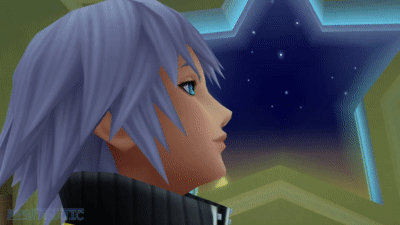
Pictured: Riku humming Sora’s name in a soft, adoring, wistful voice the way a swooning straight person sighs the name of their beloved of the opposite gender.
Kingdom Hearts gives off so many subtextual signals of queer coding that it genuinely BAFFLES me how people can really believe it is straight. You may be wondering what makes me so confident in that when there has not been anything in the games to explicitly prove any of the characters are not straight, and I will be happy to tell you. It is because in order to believe Kingdom Hearts is straight, you have to ignore WAY too much subtext. To truly believe that Sora is in love with Kairi and only coded to be interested in Kairi, you have to ignore his questioning of what love is. You have to ignore the combined keyblade he shares with Riku. You have to ignore how much the narrative is driving him to understand that Riku is his most important, cherished person. This all goes doubly for Riku who has a coming out story not unlike Elsa’s metaphorical one, in which his love for Sora is his greatest source of strength. You have to pretend the necklace gifting plot point is entirely straight and cannot possibly mean anything homoromantic. You have to ignore the way Sora cries while clutching Riku’s hand compared to his subdued and non-emotional reunion with Kairi- that’s just too much “accidental subtext” for me to confidently ignore lol. Intentional or not, KH is Gay~
Here’s how we’re gonna do this.
So where the hell do I even begin with coding KH? Well- I can’t possibly queer the whole of KH text in 1 summer, so what I plan to do is this:
Give you the tools to understand KH’s coding so that you can code it yourself~
Queer a few major KH scenes so that everyone can see that the proof is in the pudding.
I’m gonna try to break down various scenes to decode them and queer them so you can see what’s at play in KH. Originally when this meta was a single doc, I was only gonna cover 4 scenes. But since I’m breaking it into parts to update at my leisure, I’m gonna just add scenes and meta as I go~
Now without further ado:
How the Hearts in Tune scene is Gay Coded
This shouldn’t be too hard at all.~

This scene is almost too easy.
The scene opens with Sora bringing Mickey the sound idea he found but as it turns out, one sound idea is not enough. Sora tells us not to worry because he has a friend who is always picking up the slack for him. Likewise, on Riku’s end, he brings his sound idea to Mickey and is surprised to see that Sora’s sound idea is necessary to complete the song.
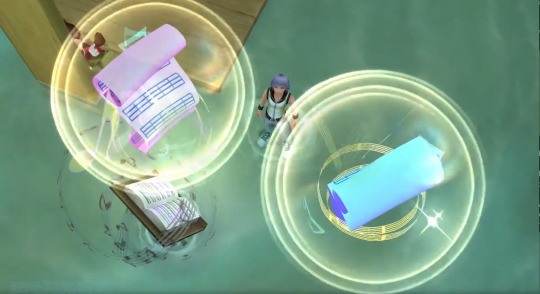
Once the sound ideas meet, this beautiful visual plays out in which the 2 sound ideas swirl around each other and the soundtrack title “Dearly Beloved” plays.
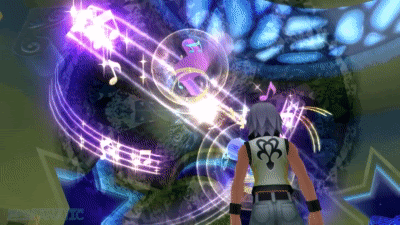
Now, there are several things I want to note about this sequence- heck this visual alone before we move on.
Recall earlier when I discussed Shiki’s point that blue and pink (likewise blue and red) “go together”, romantically.
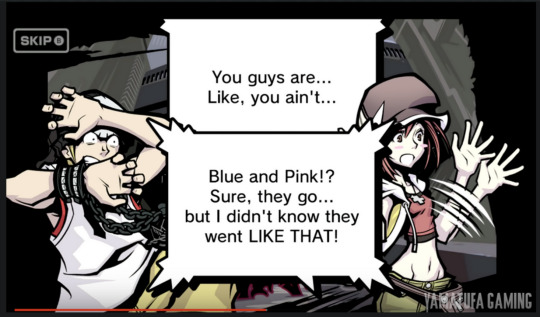
I will let the visual of Sora’s sheet music being pink while Riku’s is blue speak for itself. But I will also add how this ties into the yin and yang themes I’m about to discuss:
Yin and Yang
This concept gets its own section because it’s such an influential concept in so many aspects of various cultures around the globe.
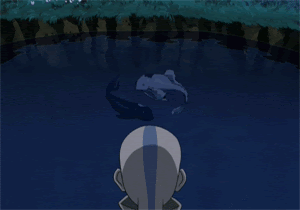
Yin and Yang is an eastern philosophy which illustrates the concept of dualism. In short, it is the concept that 2 opposite halves are complements to a whole. The original term in fact translates to dark-bright.
I am neither a philosophy professor or student so I will keep this as brief as I can and simply encourage you to study up on Yin and Yang at your own leisure. I will however paste this section from wikipedia because I think it is extremely helpful information to have for studying eastern media in general.
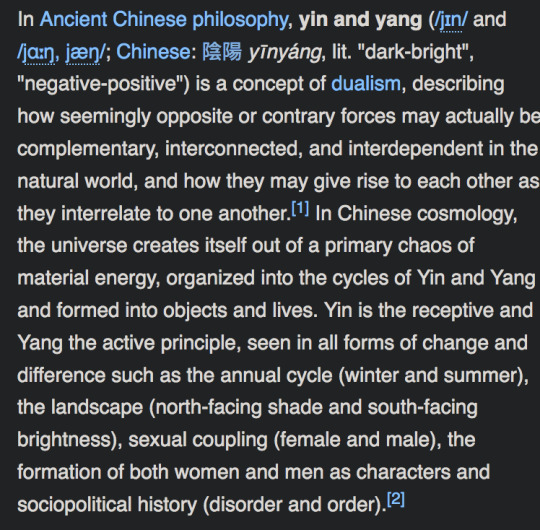
Yin and Yang: husbanded opposing forces. Dark-Light, Moon-Sun, Chaos-Order, Winter-Summer, Negative-Positive.
Female (Yin)-Male (Yang): Yes this is often used in a heteronormative heterosexual context because people are homophobic and believe in gender binaries, unfortunately, but I implore you to consider the concept in more figurative, spiritual, aesthetic themes, especially since Yin and Yang is a much grander philosophy than mere sexuality discourse; it’s about complementary forces creating a whole.
For shipping purposes, think opposites attract. Think concepts that are traditionally associated with femininity meshing with concepts that are traditionally associated with masculinity. Queer media has a wonderful way of subverting heteronormative Yin and Yang tropes by showing that cis-hetero standards can be hypocritically non-compliant with the complementary concept.
Rather than thinking of this, 2 heteros in love based on being just- the same person with opposite genders:
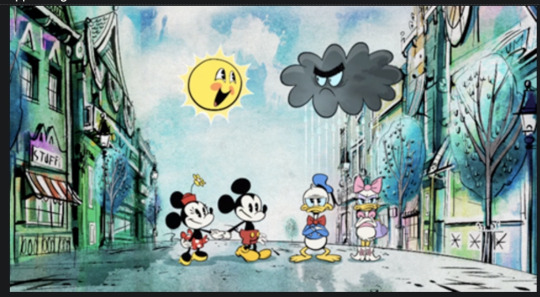
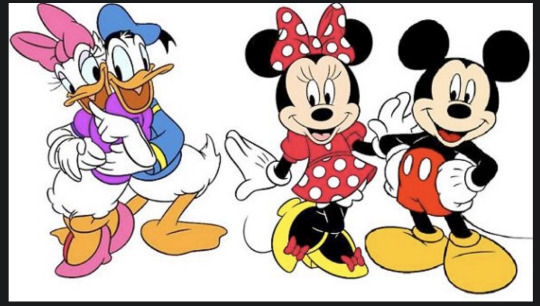
Think of this, same gendered couples with complementary personalities:
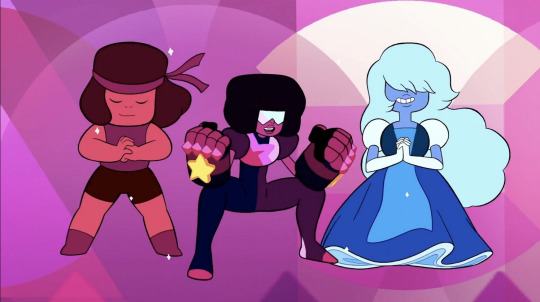
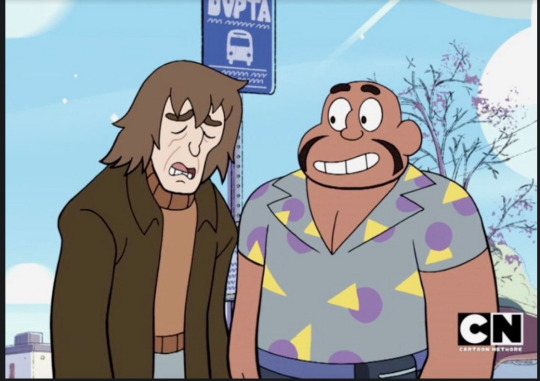
Think about how an aloof scrappy butchy vampire queen attracts an uptight calculating femme princess.

Think about how this goody-goody dumb jock with a martyring hero complex attracts this naughty cunning jock with a self-loathing villaness complex.
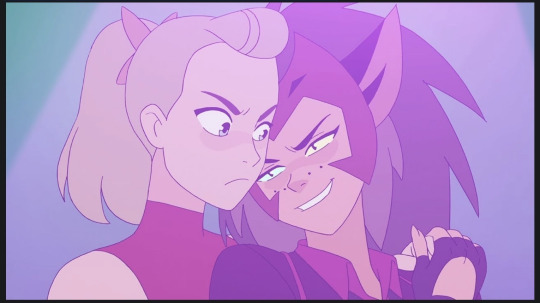
And now think about how badly we need more canonical mlm couples in children’s media lol. Oops my finger slipped. But I’m getting ahead of myself lol.
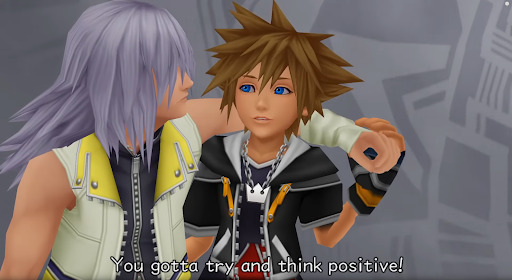
The concepts of interconnected opposite forces are so important and prominent in literature throughout the world, but yin and yang is ESPECIALLY important in Kingdom Hearts because it is a story that explicitly explores Light and Dark forces. It explores how they both oppose one another in catastrophic ways,
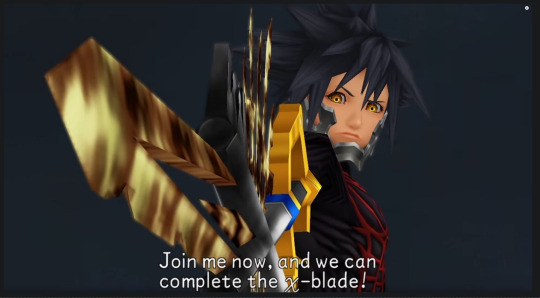
and how they complement each other in harmonious ways.

Getting ahead of myself again… But hey speaking of harmony, back to the matter at hand.
Hearts in Tune.

This scene shows a number of romantic symbols. As I was saying before the yin and yang tangent, pink and blue (nee red and blue) are already symbols of romantic suggestion. And in the case of them representing 2 parts of a whole song, these song pieces act as complementary halves, adding another layer of dualism to the scene. Furthermore, the music sheets swirl around each other in a yin and yang fashion. Harmony has been achieved. This lets us know these forces belong together. These forces representing Sora and Riku. They are husbanded together. These 2 hearts in question are part of each other. In fact, Mickey even says so:
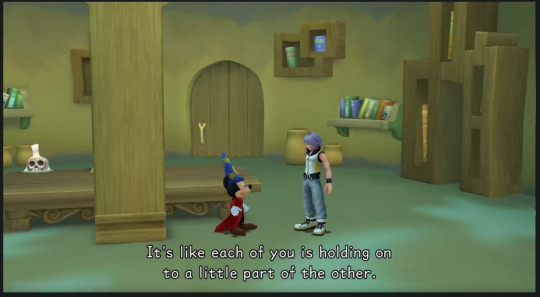
Perhaps most damning, however, is that the song in question is “Dearly Beloved”, arguably the theme song for Kingdom Hearts as far as the score goes. I’m sure it goes without say that “Dearly Beloved” is not only in itself a romantic sounding phrase but it is also the phrase specifically said by officiators of weddings to the congregation before the wedding vows are exchanged. “Dearly Beloved, we are gathered here today…”
I will also mention that Riku’s dream eater symbol visible in the shot is specifically designed based on a bleeding heart flower, a symbol of passionate love. Credit to Steam for pointing this out here, please follow them and read their posts they are magically delicious:
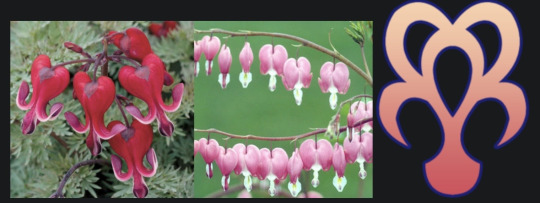
So almost everything about this scene is aesthetically romantically coded, and I didn’t even mention the fact that Dream Drop Distance’s whole color palette is themed with rainbows, which as I said earlier is absolutely still a gay symbol in Japan. Note the rainbow of colors animating from the sheet music.

So in terms of the atmosphere of the scene, its already incredibly homoromantic in every way I can think of. But what about the dialogue?
Well lets talk about the dialogue. Dialogue should always been read with care when you’re trying to queer a text. Often a lot of queer messaging in a text is subtextual. This means the text itself may actually say something gay, but you have to read further into it. This is an old method of queer writing designed to protect the writer from getting in trouble for their gay crimes.
Historical aside on this: If you’ve ever read Oscar Wilde’s “The Picture of Dorian Gray”, you may have note that Lord Henry can never just simply say that he is gay, lest Oscar Wilde be charged for homosexuality in 19th century England. Instead, Lord Henry simply tells us he is married to a woman, but makes it clear throughout the text that this marriage is mostly performative and he is not emotionally invested in it whatsoever, going against the puritanical, heternormative ideals of Victorian prudery. Lord Henry is by contrast MUCH more invested in following the life and times of his very close friend Dorian Gray, with whom he shares a hedonistic philosophy in the name of Fin de siècle. Not to be a downer but for the sake of understanding how real this subject of oppressed gay censorship is, despite keeping the homosexual themes as purely subtext, Oscar Wilde was tried and convicted of homosexuality and this book was used against him in court.
What we are privileged to have today with KH is a cutscene and not just a script. Meaning we have visuals, animation, voice acting, musical cues, etc etc to follow along with to enhance our subtext.
On Sora’s end of the conversation, Mickey points out that the song is incomplete with just his sound idea alone, and Sora tells him not to worry, as Riku is his dependable friend who will fill in where he fails. The text in the official English translation is:
Mickey: That's strange... Is one Sound Idea not enough?
Sora: Don't worry. I've got a friend out there who will help. He's always
picking up the slack for me.
This on its own sounds platonic. But note just how affectionate Sora’s voice acting is when he says it. Not only that, he clutches his heart to let us know how close he is to Riku and how much his connection with Riku matters to him. How much confidence he has in this friend he cares so much about. He then closes his eyes after saying it, smiling up in the air blissfully while he waits for their hearts to make their connection and finish the song.
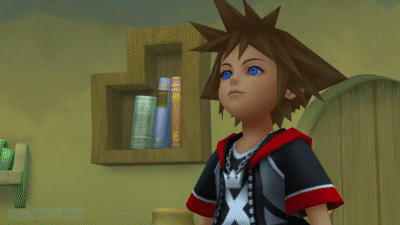
Once it is finished, Mickey remarks that their sounds joined together to make something more powerful. Sora then says looking thoughtful, “Yeah. Two forces are better than one. Right, Riku?”
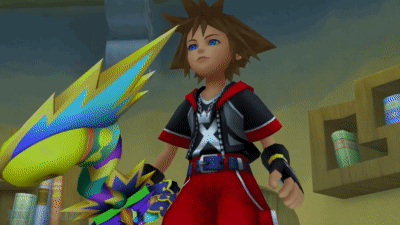
Following this, Sora leaves to fight the boss.
On Riku’s side, Mickey questions what happened, and Riku looks up thoughtfully, and says tenderly, “Sora.”

Mickey comments “Sora? Funny... Just hearing that name kinda makes me wanna smile.” and Riku tells him warmly, “Yeah. That's how he is.”
Mickey then goes on to say some really shippy stuff:
“Whaddaya know... Riku and Sora. The Sound Ideas you two set free joined together. And when they did, they made a great and powerful harmony.”
Riku then nods and tells Mickey brightly that “Sora can find the brightest part of anything, and pull off miracles like there's nothing to it. It's pretty hard not to smile around him.”
And I would like to pause to look at that line. “It’s pretty hard not to smile around him.” Although Mickey says the same thing, that just hearing Sora’s name invokes a smile, we sense a somewhat deeper meaning in Riku saying it. Why is that? Well, for one thing this game is entirely about Riku protecting Sora and exploring how much Sora actually means to him. This game is continuing Riku’s redemption arc from KH2, but it is also doing something perhaps even more important: it is providing him a journey of self discovery. This test resets Sora and Riku to level 1 so to speak, not just in their powers but even their models revert to variations of their KH1 selves. This helps to underscore Riku re-examining himself and his feelings.
And then guess what? Mickey makes some even SHIPPIER commentary. He exclaims “Wow! No wonder the music sounded like so much fun. But I bet he's got you to thank for that. Having such a good friend means he could really enjoy it.”
Riku is taken aback by this comment. “Huh?”
Mickey continues, expressing some extremely yin and yang themed sentiments,
“It's like each of you is holding on to a little part of the other. Your hearts are always in tune, so they're free to sing. Gosh, I hope I can be part of the team someday.”
Mickey did us a wonderful favor and expressed to us explicitly, for those who didn’t understand the romantic coding of the scene already, that Sora and Riku are a good match. Mickey tells Riku that the music sounded like fun in English, that it was a happy, pleasurable time, and tells him that Sora has Riku for a friend which is what must have made it so enjoyable.
So from this dialogue we get assurance that Sora and Riku are two very close friends, whose hearts are connected, and they are 2 powerful forces that merge into an even greater one. Their hearts are in tune.
Now if this were a scene about a boy and a girl, I doubt anyone would question whether it was romantic. Why should we be asked to look at it platonically just because it is 2 boys? The romantic imagery is clear.
And let me ask you this while we’re still on the subject of Dream Drop Distance:
According to Riku’s character files, he had previously thought of Sora as a little brother, and tried to be a cool older brother to him.
He then tells us that this has changed. What did it change to?
The surface level, heteronormative answer would say it changed to them being merely friends.
But isn’t that an odd regression? After all, found family is a thing, and that’s a bit weird for him to question since there is no reason for those feelings to change on that notion. If Sora loved him like a brother, that clearly hasn’t changed. Riku clearly loves Sora as deeply, so that didn’t change. The other problem with this phenomenon Riku is dealing with is that there is no reason for him to feel this strange sense of repression we keep seeing over this change. He is constantly holding back on some feelings for Sora but platonic and brotherly feelings are entirely acceptable. What is it that he is hiding? What sort of feelings for Sora would be hidden?
From the Kh2 Novel:
He really did want to see Sora and talk. But that was impossible with this appearance. The things that mattered the most were what he couldn’t tell Sora. It had always been that way.
What sort of feelings might be systemically oppressed?

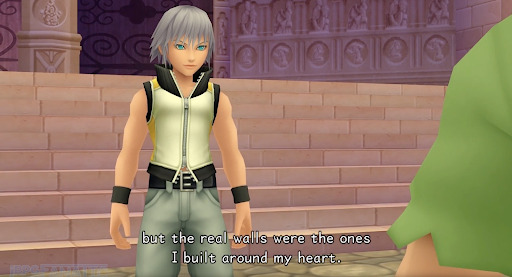
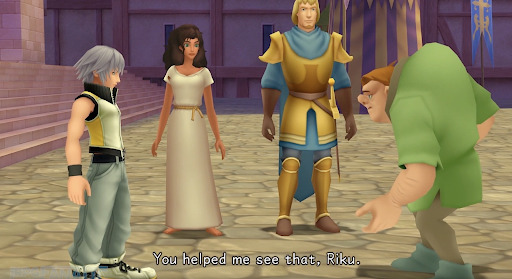
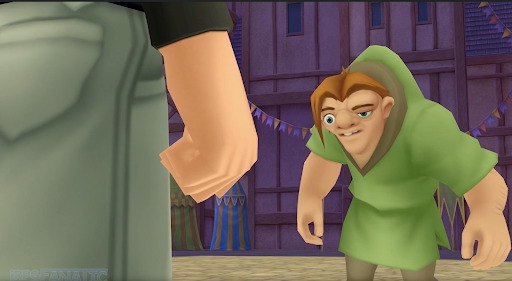
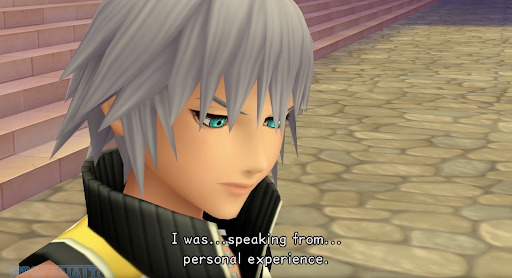
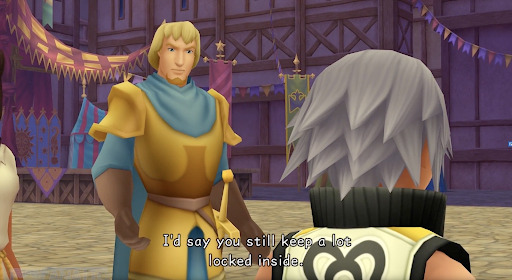
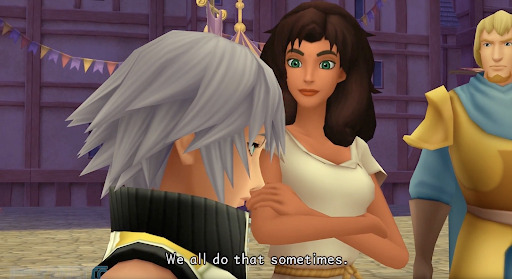
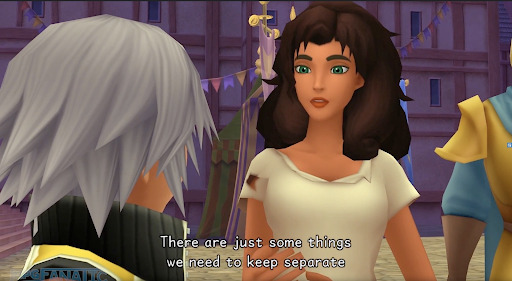
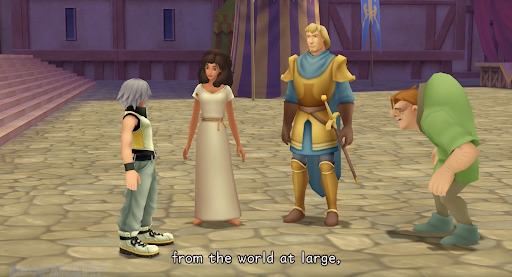
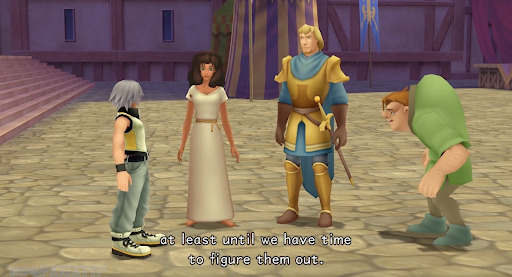
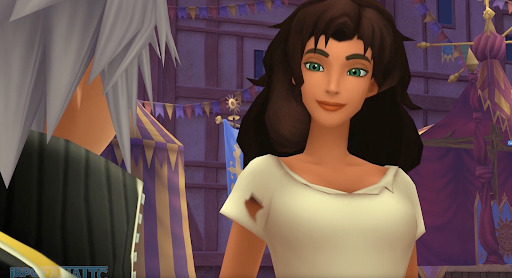

This scene is pretty much EXACTLY what I would do to say as explicitly as possible that Riku is gay without being able to say it outright due to censorship.
73 notes
·
View notes
Note
Top five lines from your writing (ie sentences that made you think “how did I write something this beautiful” or “this conveyed exactly what I was imagining in my head”).
xalskjdaslkdjf oh man. okay both you and @nightwing-hunter asked basically this same question so I’m going to answer it in one and...try not to feel super self conscious about being like OH YEAH THIS IS GOOD WRITING. I did end up with six, so I guess I’m not that self-conscious. (Look, I had two from one fic that I wanted to use! But it’s a very long fic!)
There are a few lines I might’ve chosen from fic as yet unposted, but...I decided to stick with things that other people have actually seen.
Complete with (probably unnecessary) rambling about my thoughts!
1. Was it always going to be like this? Stumbling into traps, tripping over familiar skeletons, slicing himself open on the edges of old hurts. Was there really such a thing as leaving the past behind? He still felt stuck in it, unable to move, and every time he thought he might be finally dragging himself free something pulled him back. (With Absolute Splendor)
This is like. Kind of my ur-Jiang Cheng quote, I think? Because I really do think that one of Jiang Cheng’s problems (though it’s also one of his strengths!) is how hard he holds onto things. People, and pain, and grudges. He’s so anchored by the ways in which he’s stuck in the past, the ways in which he struggles to move forward, that even as he wants to he continues to end up mired in trauma and hurt. There was another line in this fic I almost used (yes, another one) about how when Jiang Cheng imagines himself happy he thinks himself backwards; that he struggles to imagine happiness forward.
2. All of them, he thought. So interconnected. Tied together by obligation and debt and blood and pain and love. Inseparable. (With Absolute Splendor)
I have gone on record as saying how much I love the mess that is the Jiang-Lan-Jin-Wen blended family as an indirect result of Lan Wangji and Wei Wuxian’s relationship, and this is, I feel like, both an apt description of that and also something that feels very thematic to canon, to me. So much of the disaster that is canon comes from those interconnections, those ties of obligation and love and hatred, the ways that those tangle together and can’t come undone, and the ways those get more and more complicated to maintain, and how much damage occurs when they come undone.
3. The city falls, and Idril’s eyes blaze with hatred, and there is blood in his eyes, and he swears he almost remembers this, almost dreamed it once. Soon he is going to wake up, in shadows under the trees, and he will be young again, and whole. (Seven Years)
I am proud of the writing in this fic in general - it remains stylistically different from a lot of what I’ve written, and I am a bit proud of the way it’s very “Maeglin’s terrible horrible no good very bad headspace.”
But this - which is a closing line - I think remains one of the best in the fic. Maybe not the best image, but the best prose-wise. It’s fragmented, a little disjointed, illustrates - or tries to illustrate - the ways in which Maeglin is coming apart, has already come apart.
4. They fought a crusade for as yet unconquered territory. The ruthless self-command, the unbending will, an affront to two accustomed to domination in all things, and here and now the object of their frustration was at their mercy.
And, at once, a channel through which the Reid-Maletts waged their own war, a more private and intimate one, and Lymond between them the battleground. (The Compassion of the Wicked)
Lymond fic drags a kind of prose out of me that I otherwise do not write, and while it is the hardest kind of prose to write I also do end up being pretty pleased with what comes out of it. This particular fic took shape out of a glorious piece of art and the concept “what if Lymond/Gabriel/Joleta, fucked up and hot” and then it sort of turned into “how Gabriel and Joleta use Lymond sort of as the site of a proxy war that they’re waging on each other even as they are still very closely tied together and working together but also not really.”
It’s funny because Lymond in this fic almost did end up being a casualty of that dynamic: an object they were acting upon. I did not give him a lot of agency. He talks a lot, here, he gives as good as he gets verbally, but he is, very clearly, not the one in control.
The question is whether the person who is in control is Gabriel, or Joleta, or no one at all.
5. It occurred to him that it was possible that while he might have a leash, he’d just put it on a firework with a lit fuse. (a famine in your heart)
I just really like this image, and this description of Xue Yang after Xiao Xingchen’s death - because I think he is, at that point, sort of a ticking time bomb. One way or another, it’s going to go off. It’s just a question of where, when, and who gets caught in the explosion.
The joy of writing Jin Guangyao and Xue Yang across each other is the way that they both see each other. They both understand things about each other that nobody else does, even as they also have things about them that are utterly incomprehensible to the other. I almost chose another line from this fic, where Jin Guangyao thinks of Xue Yang in this state as damaged. It’s something he recognizes that most people wouldn’t: that Xue Yang isn’t just insane, but that on some fundamental level Xiao Xingchen’s suicide broke something in him that isn’t coming back.
6. You close your eyes and think about how he looked back in that town, Shuanghua slicing clean through a man’s neck, opening it to the spine, and think dizzily that he could open you like that and it’d be good, as long as it lasted. (tear out all your tenderness)
One of my favorite things about writing smut with Xue Yang in it is the way that sex and violence live so, so close together in his brain - and not just sex and violence but sex and death.
I continue to be fascinated by the way that Xue Yang walks a thin, thin line between reckless and cautious, between survivor and adrenaline junkie, between being pulled toward the idea of death and driven to stay alive over everything else.
And that’s like. A part of what’s going on here. But also - you know that immortal Wei Wuxian/Lan Wangji moment with the if I have to die at least I could be killed by you (paraphrase, don’t feel like looking it up right now)? Yeah, that’s here too. Less in the “it’d be worth it because I know it’d be right” sense, though, then the “better go down to you than anyone else” sense.
Xue Yang has considered his ideal deaths list in detail and at this point “killed by Xiao Xingchen” probably occupies the number one spot.
33 notes
·
View notes
Text
Star Wars: The High Republic #1 Review
In terms of the comic, the first issue is the definition of a C story – it is a 7 out of 10 because it is average. The simplicity and lack of depth is both the saving grace and condemning damnation of it.
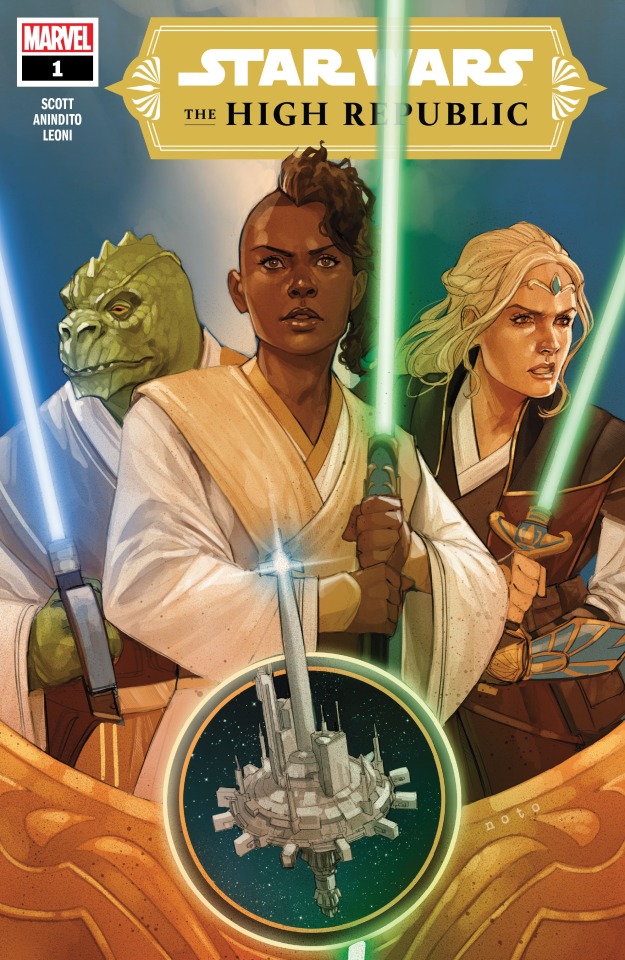
The story follows a new, human Padawan called Keeve Trennis, who is revealed to be on the planet Shuraden, partaking in her final Jedi trial; result of which will be the deciding factor of whether she become a full fledge Jedi Knight. Chaperoning and assessing the trial is her Jedi Master, Sskeer – a Trandoshan – who is sporting one arm (more on that later on).
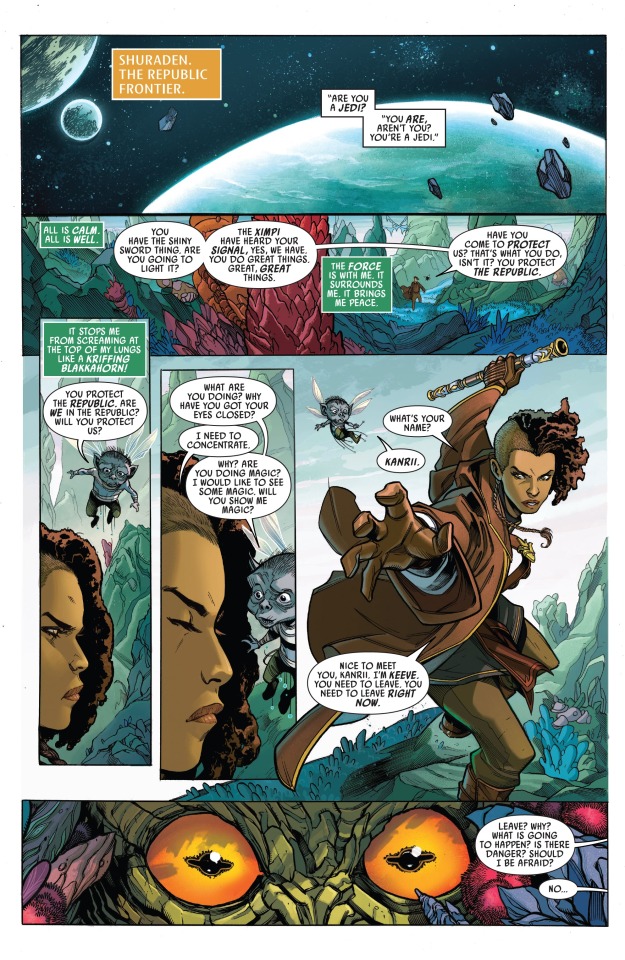
During said “final” trial, a swarm of giant alien insects – called Ridadi – pop out of nowhere and start stampeding toward a community of fairy like aliens, called Ximpi. Keeve makes an “audacious” choice to abandon her trial in order to save the village. One thing to note, is that she made a utilitarian decision during the course of her rescue, as did not attempt to save one Ximpi who was swallowed whole – she allowed the death of one to save the lives of many.
After relaying the situation those at Starlight Beacon’s, in particular Master Estala Maru, she is told to read the minds of the insects; in doing so, she gathers that these creatures normally using a magnetic homing beacon to guide their migration course – Starlight Beacon has thrown it off course and if Keeve were to fail to stop them here, they would eventually fly to the Beacon, itself.
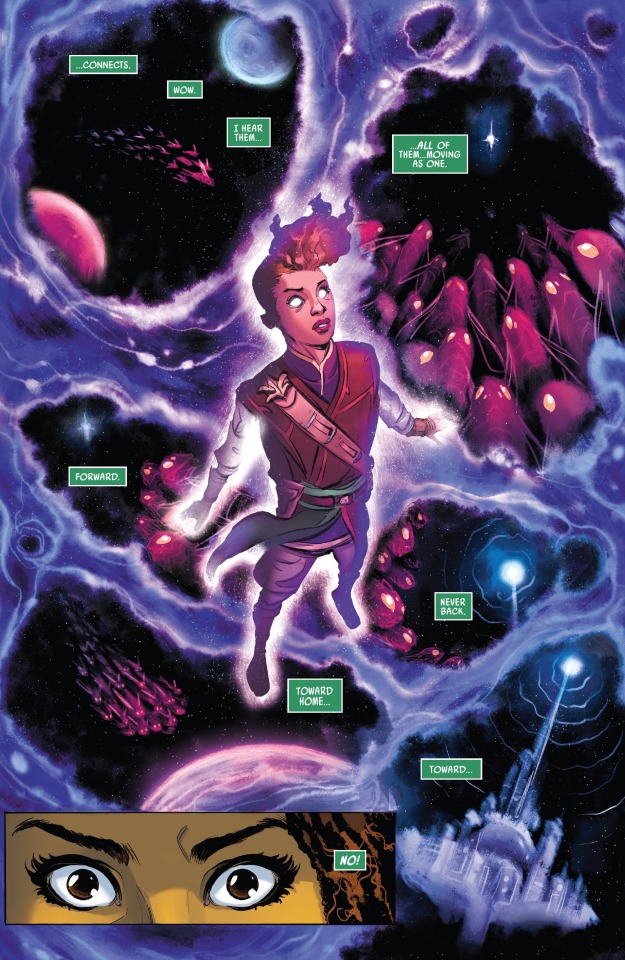
Using a new lightsaber powered, Force attuned ship – a Vector – Keeve is able to steer the bugs back on course and off of the planet.
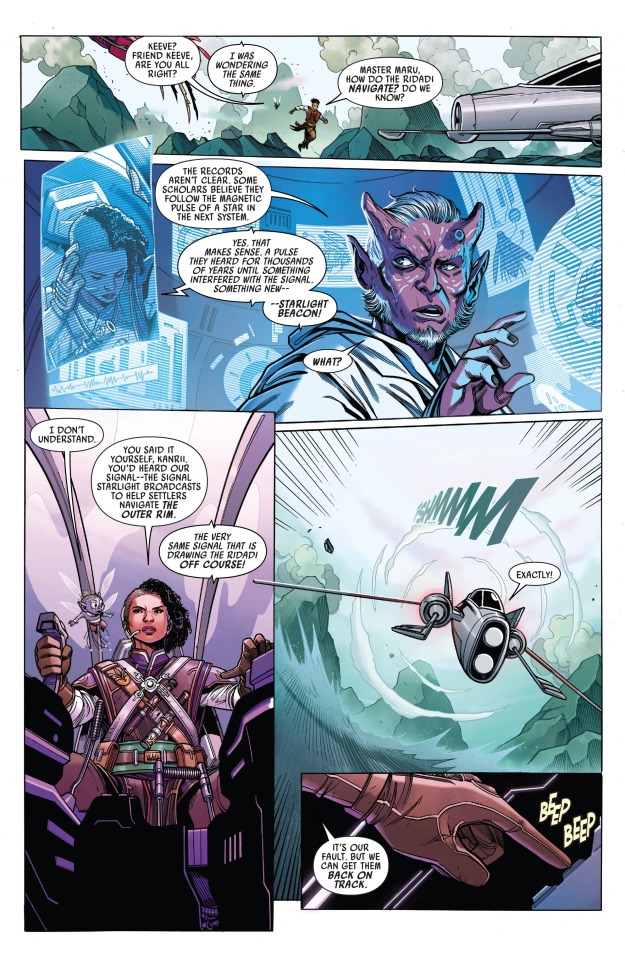
As she reconvenes and recounts with her master, he takes her the Starlight Beacon. Thinking she is about to be expelled from the Order for failing the trial, a new Jedi Master, Avar Kriss – who, via Grandmasters Veter and Yoda, most recently was christened as the new Marshall of Starlight Beacon, officially promotes Keeve to the rank of Knight. As her valediction ceremony takes place on the Beacon, itself, we see Keeve shedding an emotional tear of joy.
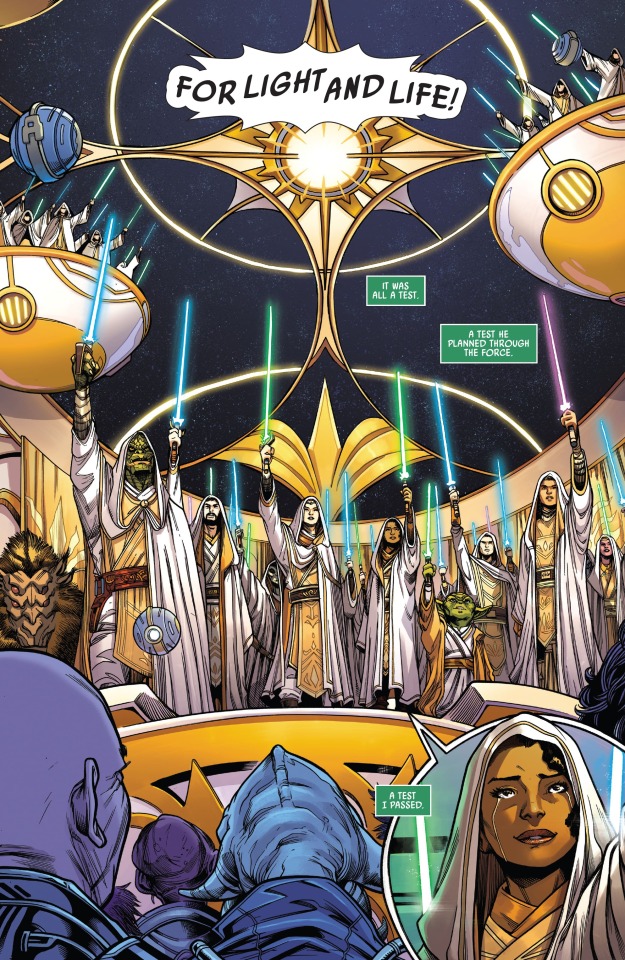
This is interesting as, I thought it was the padawan’s master that would knight them but, this seems not to be the case. Even more curiously, the Jedi do not exclaim “May the Force be with you” but, “For Light and Life”. At the conclusion of the comic, we see Sskeer alone in his chambers screaming “No!” at the top of his lungs.
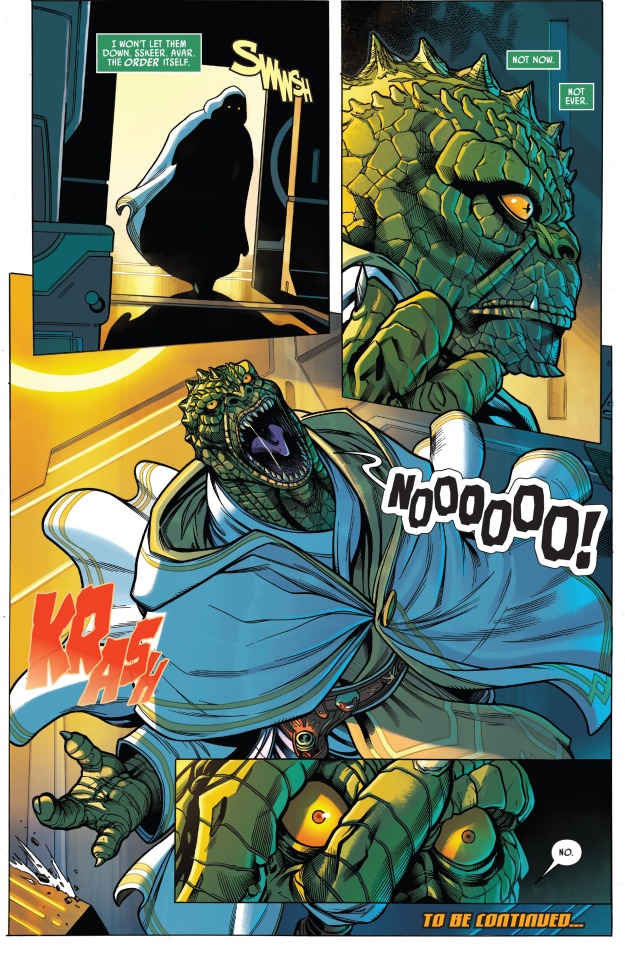
As forementioned, this debut issue is the epitome of a C story and as so earns it’s 7 out of 10. This is my first introduction into Cavan Scott’s writing and, so far, it is subpar at best and candidly amateurish at it’s worse. The narrative was very telegraphed at times and makes mistakes that are unbecoming of a writer given this caliber of material to work with. Writers like Greg Wiseman, Kyle Higgins, and or David F. Walker would not be making these kinds of errors – Marvel might need to call them to take over.
In the same vein, Ario Anindito’s art is decent but, could be better. It’s not as crisp as I think it should be and looks like it needed another render. Artists like Dan Mora, Stefano Caselli, and especially Doc Shaner would have delivered an efficient job as opposed to the sufficient one Anindito is giving.
It’s vexing as honestly, there is something there in terms of Keeve Trennis in terms of both her character and design.
I am more than fine with a protagonist that doubts themselves because that is a manner in which we are able to learn with them, and there is definitely an avenue to explore with a newly dubbed Jedi Knight still working on finding her niche in the Order. Reviewers, like Thor Skywalker, are not so keen on her having these kind of thoughts and emotions but, it makes sense to me. One of the eventual downfalls of the Jedi was that they were trying to negate their emotions as opposed to controlling them. Keeve showing self-doubt illustrates her struggle to regulate her emotions but also that allows herself to feel the doubt work through it. Nonetheless, it seems as if we, the reader, have missed an arc and or development with this character – I think it would have been more apt to show her in the Order working her way to the trials as opposed to the last hour of her last trial AND her becoming a Jedi Knight; this is reinforced by the alleged rapport and pedestal she puts Sskeer on – it’s more tell than show and a comic book is meant to show.
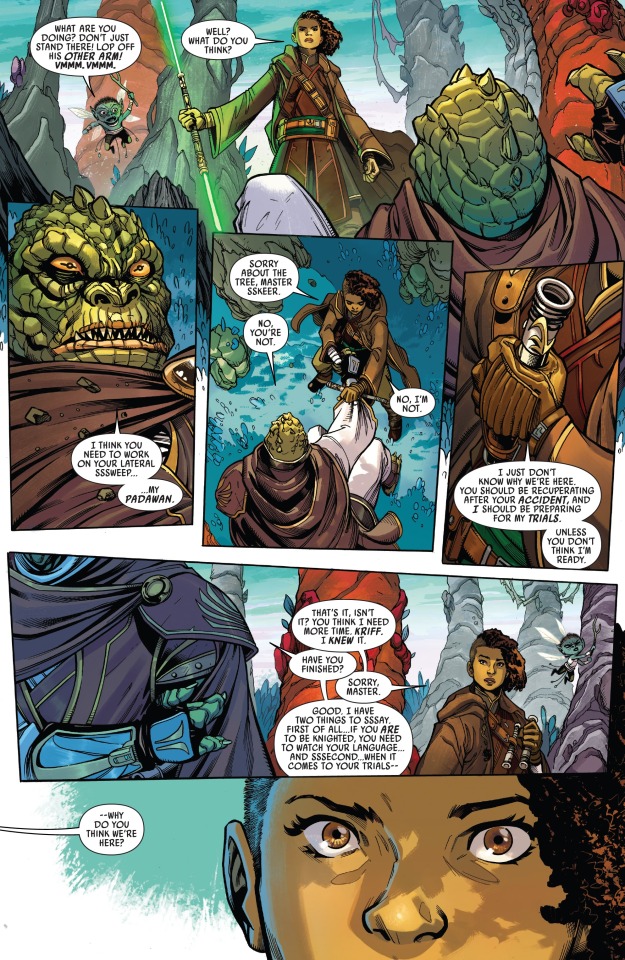
In accordance with this self-doubt, she also has the quirk of cursing. This is interesting, albeit jarring because of the era she is in – the High Republic has been presented as the apex of the Order and as so, I thought that meant this would be the time where the Jedi would be the most dogmatic and adherent to their traditions and mentality.
Her design yields the same jarring aspects, once you go beyond the superficial facet. At first glance, it’s very attention-grabbing; young Black woman with half her head shaved on one side, utilizing two lightsabers – holstered on her chest – that she can combine into a dual-sided lightsaber. However, once again, this seems to be out of place given the time period and temperament of the era. Does it make sense for a Jedi in this era to be so bombastic in their look, particularly when it comes to her hair? Seems like a better fit for a time of REVIVING the Jedi Order as opposed to them being at their APEX.
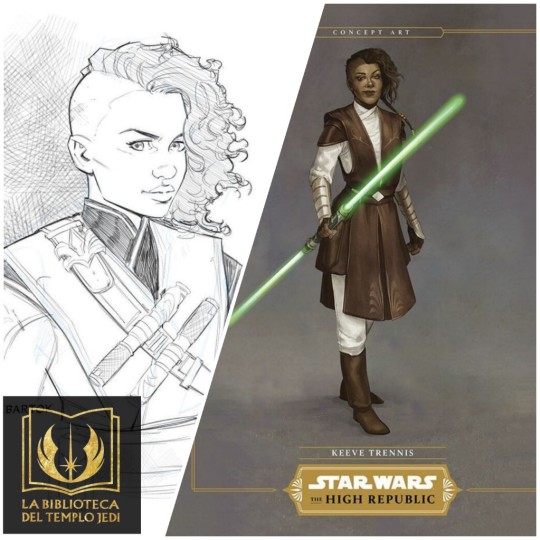
In the Light of the Jedi novel, it is said that Keeve sees the Force as a tapestry – a massive piece of art that spreads across the universe. This is a really nice take on the Force and I hope it gets expanded on with her character in this series – it certainly could attest to aspects of her design, such as her hair. I haven’t really seen Star Wars characters interested in art aside from Sabine Wren, Grand Admiral Thrawn, and Alva Brenne; now we have a character who the Force IS art for her. Granted, this aspect of hers has not been seen and or mentioned in the comic and it SHOULD be as this is the formal DEBUT of this character for many people.
The issue gets some major points off, as well because:
1. Keeve’s uses her lightsaber to not only slow down descent but to stop the fall completely.

This is cardinal sin that follies in the mechanics and use of how lightsabers work. This happens nine pages in and broke my immersion within the issue - immediate red flag.
At best, an argument could be made that because this is set 200 years before the Skywalker Saga these sabers are weaker than their future counter parts and therefore not as potent in terms of lethality but, this is me – the fan – writing for the writer. Star Wars (or its content creators) simply do not get that luxury anymore. Plot holes are to be called out by the consumer and filled in/addressed by the writer; plain and simple.
2. There is a general lack of references and or footnotes to other material – particularly to the current books and comics – that would have given context to some of the events and tools used in the comic. Prime examples of missed opportunities to seed this world cohesively take form in Sskeer’s missing arm, the Ximpi themselves, and the Vectors.
The High Republic, as a whole, was marketed ongoing multimedia project and as so, interconnectivity should be the prime focal point of this serious. Continuity is key ESPECIALLY when they’ve thrown out the old canon and are new canon. The tools are there – USE THEM!!! The book – really Charles Soule in general – is doing the heavy lifting of world building and establishing many of the characters – the least Scott can do is alley oop these layups.
3. As mentioned earlier, Keeve uses a Vector to as the driving force to solve the problem but, there was no footnote and or reference to the fact that this was a special kind of ship. Moreover, the use of the Vector has already broken the canon that has JUST been established for it – Vectors are powered by the Jedi’s Lightsaber, the hub changes color to that of the lightsaber that activated it, it is steered by the user’s ability with Force, and there should be no autopilot and astromech droids there to guide it based on the fact that these innovations are rare within the galaxy in this era.
Why add these parameters if the creators that be are not going to adhere to them?
Ultimately, this issue threatened to be interesting. If this is the modus operandi of the series as a whole… making good on the threat will be the difference between triumph and downfall.
#star wars#high republic#cavan scott#ario anindito#keeve trennis#sskeer#avar kriss#estala maru#shuraden#ximpi#vector#starlight beacon#grand master#veter#yoda#light of the jedi#charles soule#greg weisman#kyle higgins#david f. walker#dan mora#stefano caselli#doc shaner#sabine wren#grand admiral#alva brenne#thor skywalker
8 notes
·
View notes
Text
Some headcanons for The Long Road that absolutely nobody asked for
Who’s the messiest one:
Everyone has their places that they are the messiest one in.
dean: when he cooks, he does not clean up the kitchen afterward. he reasons that cleanup is sam's detail, because that splits the work 50-50. most of the time, sam is okay with this because he doesn't particularly enjoy cooking and is tired of takeout. he'll bitch dean out in three circumstances: 1, he hasn't been there (fair), 2, he wanted to eat out (less fair), 3, DID YOU REALLY HAVE TO WRECK THE WHOLE KITCHEN TO BAKE A FRICKIN PIE (least fair).
when it comes to the state of his room, though, dean falls right between sam and adam. it's his space, so he reasons everyone can mind their own business. sometimes he is really on top of it; other stretches of time, he'll let things pile up / get out of place before he'll do something about it.
you so much as leave a to-go cup in Baby, though, and God help you.
sam: between the three of them, sam tends to be the most orderly and tidy. BUT, leave that man alone to his own devices in the library? he's probably fallen asleep atop an entire table of "organized chaos" of open books, pages of notes, a new (unimplemented) filing system, a dozen bookmarked tomes, and a couple dozen pens lost amid the chaos. sam in research mode + cross-referencing & digitizing & organizing the men of letters' archives into a streamlined and interconnected, coherent system is...a lot. just like A Lot. and it Shows. (and sam's loving every minute of it. utterly geeking out in his own head.)
adam: is a disaster child. he'll let shit pile up until he has to deal with it, or is otherwise bitched at enough by (usually) sam. he doesn't have a lot of stuff, so it can't reach actual problem levels in the bunker. but he's totally the kind to be like, "what the hell? how long has this been here? hey, guys, when did we eat at burger king? oh god, we should definitely toss that at the next gas station. what? no i'm not going searching for a trash can right now" about his car.
Who feels the most uncomfortable about PDA:
it is, get this, sam. i know, i know. hear me out. when given the option, adam can and will be affectionate within reason. he's the most uptight and gunshy about it at first, when he just gets out of the cage; tends to withdraw from people getting too close, always on edge; as a survivor of the most Traumatic Thing in the Universe, that is more than fair and expected.
once he's had time to find his footing with sam & dean, however, he'll greet them with a bro-hug, when appropriate, a slap on the back, a nudge of the elbow, lowkey affection like that.
dean came back from purgatory more affectionate than he'd ever been before. much more readily will not only greet with a hug, but say goodbye (even in 'casual' partings) with a hug.
that leaves sam, who used to be considered more mushy than dean by these terms. dean's lowkey affection he's used to. adam's? nah. no. especially in the first 5 years, for the amount of time that adam does it (before shit gets Real Bad). after adam gets out of the institution, he gravitates more towards sam naturally, even when pissed, and sam's kinda lowkey why is he in my personal space??? weird. because it doesn't innately fit the same kind of way it does with dean. post-reintegration, he's more affectionate after they've found their footing again. he tries to make up for the Bad Years with more slaps on the shoulder kind of affection. boy's trying.
Who’s the funniest drunk:
sam is a disaster drunk. he's the biggest lightweight of the three of them, which is funny because he's also the biggest, just like the biggest in general. dean becomes so much fun in unexpectedly different kinds of ways. like, he can be talked into karaoke. or doing some stupid shit he's gonna regret in the morning because odds are it's not gonna end well.
but adam is straight up hilarious. that sharp wit comes out, and all his inhibitions (and image) are gone so he just straight up cracks the worst jokes ever and gets away with it. they land. somehow they land. maybe because sam & dean are also drunk. maybe because he is just that funny. maybe it's that he has a tendency to get blackout-wasted and do stupid shit that makes no sense whatsoever, like shower with his f*ckin socks on and dean is never gonna let that shit die.
Who texts the most:
adam or dean. during large periods of time in the first 5 years, adam will leave dean on read and dean texts because read receipts means he knows when adam is checking his messages and therefore he knows adam is at least alive, if not entirely alright. by that view, dean texts the most.
but for random shit, that would be adam. he'll text dean something like

with either no caption, or something like: this reminds me you need to hit the gym, or looks like you have competition and doesn't give further context. dean doesn't mind because at least it means the kid's not dying in a basement somewhere.
he'll kick his ass for the fat comment later
Who reads the most:
it goes in this order:
sam "i read this entire book in one sitting cause i had the time, and now i am awake at 1am because i can't decide if i want to start another one since i have down time" winchester
adam "does it have cool illustrations? no? fine, at least tell me the lore on boobries is correct" milligan
dean "what job has the least amount of reading?" winchester
Who has the most embarrassing taste in music:
eff. ing. adam. even in his own car (where, hey, the rules are driver picks the music dean!) he's only allowed a certain amount of time for his "whiny teenage garbage music" (thanks dean) before he has to change it to something a little more tolerable (rock, at the very least). heaven help him if he hints at something country with dean around. dean will be like, sit your ass down it's time for REAL music 101 and put on Metallica for the 8th time.
Who’s better with kids:
adam, with dean a very, very close second! so close, they probably tie. adam, early on, isn't good with anyone because fresh-out-of-the-cage (even post-institution for a bit) makes him kind of a hairs-breadth triggered bomb when it comes to people of all ages. but adam a bit more balanced? a natural. he grew up around extended family, friends, wanted kids of his own someday.
sam, however, is the absolute worst. a pure disaster moron in this arena. when adam is de-aged? dean didn't think it was possible for sam to suck so much at something. (don't worry, the boy found his bearings. but oh man...the road to get there, paved with more potholes than road.) BUT when sam really tries? like if he lets himself relax and lowers his inhibitions, he can do pretty well. but he's mostly just Highly Uncomfortable around kids, and like, it Shows.
Who’s the one that fixes things around the house:
dean. put that boy in the garage, under the hood of a car, great. can do it all. put that boy in front of a little home repair? renovation? by god he'll figure it out. and he won't put a hole in the wall shut up sammy. he takes pride in the upkeep of the bunker.
sam, however, is much more content to just be like ah man i wish we had a shelf here. or, oh right we need to remember to do xyz and then sit back and wait for it to Magically Take Care of Itself.
Who’s got the weirdest hobby:
hobby? what the hell is that? a homeless person?
Who cooks and who cleans up:
dean cooks, sam cleans. adam cooks, sam and dean will rock-paper-scissors for cleanup. or leave adam to do it. sam is never allowed to cook. he's a horrible cook. they'd literally rather eat out than let sam cook. sam, of course, is highly insulted, but also like...he knows dean & adam are better cooks. they just are. yes, fine, he'll wash the dishes again.
every now and then he gives it a shot. surprisingly he makes really good pancakes. he'll cook just to force one of the others to have to cleanup when he's tired of being on dish duty. dean & adam are not impressed when he tries to leverage sandwiches for dish duty.
sam, somewhat sloshed on a saturday night will be like, guys! guys! hey why don't i make us food and dean and adam are like, duuuuuude. ...wait, no. sam- and he's like, no, guys, i got this, and brings them microwave burritos. and THEN they're like hey! no! this does NOT mean we're doing dishes!
#the long road#supernatural#tlr headcanons#dean winchester#sam winchester#adam milligan#ioannemos#i'm tagging you in this even though you did not ask for it
3 notes
·
View notes
Photo

“"Be with me," she whispered, falling deeper into the space where only the Force could exist. "Be with me."
And they were. As she continued to meditate, she could feel them as one with the Force. All of the Jedi who came before and she wondered how she had been so blind as to miss them before. They had always been there. She was not alone and would never be alone again. They were with her wherever she was if she would only listen.
A familiar tug at her core announced another appearance in the Force, and cracking open an eyelid, she sensed Ben, only a very faint cross-legged outline of him, meditating alongside her.
She wanted to scream from relief, to study his face, to assault him with more questions, but she knew the only thing keeping him here was their powerful connection. A bond that was fueled by the Force and she would not lose focus on it, instead letting it expand and contract with the energy of interconnected life surrounding them.
Clearing her mind of questions, she tried to just be.
Minutes or hours passed, it didn't matter. The Force was both instant and eternal all at once.”
Chapter 4, Excerpt from ‘Haunted’ by @erickawrites <3
https://archiveofourown.org/works/21870838/chapters/52438549#workskin
Illustration by me @jenniferladybug
52 notes
·
View notes
Text
The Last Jedi and Nonviolence
Peace and Purpose:
The Philosophy of Nonviolence in Star Wars: The Last Jedi
Evan M. Banks
Spring 2019
“And where we had thought to find an abomination, we shall find a god; where we had thought to slay another, we shall slay ourselves; where we had thought to travel outward, we shall come to the center of our own existence; and where we had thought to be alone, we shall be with all the world.”
-Joseph Campbell, The Power of Myth
“Death is a natural part of life. Rejoice for those around you who transform into the Force. Mourn them do not. Miss them do not. Attachment leads to jealousy. The shadow of greed, that is.”
-Yoda, Revenge of the Sith
“Let the past die. Kill it, if you have to.”
-Kylo Ren, The Last Jedi
“Your weapons, you will not need them.”
“What’s in there?”
“Only what you take with you.”
Yoda and Luke, The Empire Strikes Back
Studying religion and philosophy in the Star Wars universe has been a time-honored tradition among eccentric scholars with a penchant for all things geek since the first film debuted in 1977. What is widely regarded as one of the best qualities of the franchise is that it follows relatable characters and tells relatable stories in a fanciful and faraway place. Moviegoers from all over the globe identify with these characters as they face Earthly problems—love, betrayal, slavery, loyalty, devotion, religiosity, pain, loss, anguish, and triumph. It is in this reality that the developers of the franchise discuss complex philosophical, religious, and moral questions that humanity has struggled with since time immemorial. However, what sets these conversations apart from the human condition as we know it is the ever-present existence of the mysterious energy field that is commonly referred to by Star Wars’ pantheon as, “The Force.” At no period throughout the experience can a viewer reasonably argue that in the Star Wars universe, the Force does not exist. Yet, to what degree does the Force affect itself upon actors within the universe? This is a question that, throughout the stories, the creators of this morality play try and tackle—or at least use to explore the possibilities of what truth is. The existence of an interconnective power that may or may not influence actors’ decisions, thoughts, and actions comes with it the necessity of religions and philosophies within the universe itself that attempt to explain or interpret this phenomenon. These in-franchise vehicles are necessary to characterize the feasibility of the otherwise impossible feats carried out by benevolent or nefarious space-wizards who can harness and observe this powerful Force.
For over forty years fans and scholars have discussed the subtle and overt nuances in Star Wars and it does not take much to get two fans together to begin arguing about the nature of the Force, the role of government in society, what makes goodness and evil, and even the intrinsic value of a life, i.e. was Han justified in shooting Greedo in Episode IV? But by 2017, forty-one years later, the narrative started to take a turn. Filmmakers were criticized for rehashing the same old stories over and over again—which is wholly ironic considering that George Lucas derived a great deal of his inspiration from Joseph Campbell who posited that many of the Earth’s great myths were of independent invention yet held the same truths, and every great epic story since their advent were variations and derivations of these same morality plays. In light of these criticisms it was essential that the filmmakers explore new ideas and communicate a new message—at least one they had not communicated before. And in Star Wars Episode VIII: The Last Jedi, that message pertains to how effective nonviolent action can be in the face of extreme tyranny. To discuss this relationship, a foundation in established Star Wars philosophy is essential.
There is no better place to start than Joseph Campbell. As a prominent and influential scholar, Campbell posited many theories regarding the nature of myths and their relationships with culture and even one’s own being. George Lucas is known for utilizing Campbell’s mythological models of storytelling.
Star Wars became an immediate, global phenomenon in large part because it portrayed a cosmic struggle between good and evil that was vivid enough to resonate with the audience but general enough so that any person, from any religion or background, could identify with the heroes and root for their struggle against the villains. This universality was completely intentional; George Lucas, adhering to Joseph Campbell’s concept of the mono-myth, believed that all moral teaching share certain core messages about good and evil. Lucas envisioned Star Wars as a galactic version of this one mythic story that would crystalize the basic truths that he believed resided in the heart of every religion or philosophy. For Lucas this was the idea that we all face an internal struggle between kindness, selflessness, and compassion, on the one side, and greed, corruption, and cruelty, on the other.[1]
Campbell himself even cites Luke Skywalker specifically as a mythic hero that the audience is to learn with.[2] Campbell illustrates that aspect of humanity—the need for society to have rightness modeled for it, what that rightness looks like, and how good and evil interact with that rightness. In Star Wars, evil and good are elements brought upon by actors but evil does not exist within the Force itself. Nature does not have the capacity for evil. Nature just is. The Force is. But when individual actors or actors en masse begin to learn to manipulate nature—manipulate the Force, that power is capable of being abused. And out of that abuse, a perversion of the nature of The Force is born—an Evil that is not only physical, but structural, and spiritual. This perversion must be combatted. How best to combat it, not whether one can win against it, is the question posed in TLJ.
Star Wars presents a dilemma in how one associates themselves with power balances and the role of an individual within these power structures.
Darth Vader has not developed his own humanity. He’s a robot. He’s a bureaucrat, living not in terms of himself but in terms of an imposed system. This is the threat to our lives that we all face today. Is the system going to flatten you out and deny you your humanity, or are you going to be able to make use of the system to the attainment of human purposes? How do you relate to the system so that you are not compulsively serving it? It doesn’t help to try to change it to accord with your system of thought. The momentum of history behind it is too great for anything really significant to evolve from that kind of action. The thing to do is learn to live in your period of history as a human being. That’s something else, and it can be done.[3]
Considering this, Campbell comments on the accessibility of such a humanist philosophy and states that Star Wars asks the question, “…are you going to be a person of heart and humanity—because that’s where the life is, from the heart—or are you going to do whatever seems to be required of you by what might be called ‘intentional power’?”[4] In this question lies the heart of the nonviolent argument that Rose in TLJ articulates. She states plainly explaining the moral lesson of the film, “That’s how we win, not by fighting what we hate, saving what we love.”[5] Campbell argues further that this idea of the “heart” is what is effective at challenging the machinations of evil, or in the case of TLJ, an extrajudicial tyranny. That positive change starts from within oneself and only once one achieves this balance and contentment with humanity and its role in love against tyranny can evil be triumphed over and redemption had.[6]
Campbell is very clearly speaking in the vein of nonviolent resistance much in the same way that Gandhi purports that the means and ends are one—that in order to truly achieve peace through nonviolent means one must embody the principles they preach. “We but mirror the world. All the tendencies present in the outer world are to be found in the world of our body. If we could change ourselves, the tendencies in the world would also change. As a man changes his own nature, so does the attitude of the world change towards him…We need not wait to see what others do.”[7] This concept of embodying change through a personal and in an inwardly-focused fashion is rife throughout TLJ. This message of inward change permeates throughout the franchise but reaches its most tumultuous as Luke Skywalker suffers a crisis of self when he turns from nonviolent means for a fleeting second as he stands over a sleeping Ben Solo with an ignited lightsaber assuming he can deny his nature and take a life in the interest of goodness. Luke had already learned the effectiveness of nonviolence from his encounter with The Emperor in his quest to change the Satyagraha—Gandhian “Soul Force”—of his father, Darth Vader. When Luke fails his own humanity, his own nature, and betraying his love, the galaxy is once again occupied by a systemic evil promulgated by a betrayed and confused power figure. While Luke fails in this respect, what he has passed on from his experiences with Vader, continue throughout the leadership of The Resistance in Leia.
It is important to note that The Resistance is not a state-sponsored entity but one that stands in protest to The New Republic’s appeasement of The First Order. The aptly named, Resistance’s primary focus in the films has been to flee as they work to destroy weapons of mass destruction. While not entirely nonviolent, these fighters do not entirely belong to the order of the Jedi and are thus not required to adhere to the tenets that Luke Skywalker purports. Which means there are elements of evil among them. Scholar Charles C. Camosy in, Chasing Kevin Smith: Was It Immoral for the Rebel Alliance to Destroy Death Star II, argues that it is a matter of motivation in determining whether taking lives in the interest of removing a WMD from the arena is moral. Essentially, the difference is that while Grand Moff Tarkin in A New Hope, and thus like the First Order in The Force Awakens, is pleased with the destruction of whole planets as a symbol of power with the intention to subdue whole populations to the will of The Emperor and the machine, the Rebellion akin to The Resistance are primarily concerned with the saving of lives and indeed mourn the mass death that came from the destruction of these weapons. In the opening sequence in TLJ, Poe takes out the deck cannons of the dreadnought and as soon as the evacuation is complete, Leia commands that he returns—intending only to secure the escape. A disarming tactic. Poe is to learn that engaging with violence beyond what is completely necessary is unjust. But doing violence even as a defensive countermeasure comes with it some intrinsic badness in that there is harm done. In this line of argument, Camosy is supporting the notion of Just War Theory. Yet, he does acknowledge the conflict inherent to Just War Theory in that there are no clear distinctions between good and evil on Earth as there are in Star Wars.[8]
From the opening scenes of A New Hope, the “culture” of Star Wars conditions us to root for the Rebels. Looking at the movies through this lens can blind us to the questionable decisions of those we are told are the “good guys.” The ability to challenge the dominant cultural lens through which most of us look at the world and ask critical questions of our own “side” is as rare today as it is important.[9]
And here viewers can see the crux of the argument in TLJ. The unnamed Benicio Del Toro character, “DJ,” very blatantly demonstrates to the protagonists Finn and Rose that The First Order does not have the monopoly on evil. Evil permeates society and even their own organization—the Resistance. Finn and Rose had just escaped from the casino city of Canto Bight that that was filled with arms dealers flaunting their spoils. Its not enough that they harm in business but even these arms dealers’ hobby involves enslaving children and harming animals.
After Rose communicates a personal connection to the harm that developing weapons can cause, she shows Finn the dangers of the military industrial complex—a true perversion of nature: metal twisted to destroy as quickly and efficiently as possible. As viewers are enraged with the idea of these developers testing weapons on the same people that built them, they are momentarily ripped from the idea of “good guys” and “bad guys” when DJ illustrates that The Resistance has been buying weapons from these same people, thus perpetuating the cycle of violence. “Good guys? Bad guys? Made up words…Finn, let me learn you something good, it’s all a machine partner, live free, don’t join.”[10] Barry Gan in Violence and Nonviolence takes an in-depth look at “The Myth of Good Guys and Bad Guys.”[11] He deconstructs the notions of the two types of individuals and illustrates that as one perpetuates this myth, they feed a beast that treats others as less than human and in turn justifies the maltreatment of individuals who are, more than likely, just like themselves. And in an interest of defending groups against a “bad guy” that does not actually exist in logic, “we become convinced that it is wiser to spend money on arms rather than education, on training people to destroy communities instead of build them.”[12] By choosing to juxtapose arms with education, Gan is demonstrating that society’s most powerful tool in the promulgation of nonviolent interests is education. This is something that the Jedi religion and indeed, Luke Skywalker’s crisis touches on extensively during the experiences he has in TLJ.
The morality and nature of myth explored throughout Star Wars is typically dichotomized between two entities in conflict with each other wherein either persuasion is plainly categorized as “good” or “bad.” The goodness and badness of entities and actors is more or less hand-fed to the viewer. It is clear who one is supposed to root for in the story. Yet, as the characters become more complex through their story arcs, so does the philosophy and differing opinions on the nature of the Force and its relationship with goodness and badness or good and evil. Indeed, they vary in opinion regarding the nature of good and evil itself. The Last Jedi attempts to bridge gaps in conflicting interpretations of the Force and brings with it the approaches to violence supported by two competing cosmological arguments—cosmotic and acosmotic.
These concepts lend themselves to the conversation regarding evil itself in such a way that is quintessential to Star Wars’ in-universe philosophies that support or denounce the use of violence. In “Balance through Struggle: Understanding the Novel Cosmology of the Force in The Last Jedi” Terrance MacMullan characterizes cosmotic beliefs as holding “that there is really only one true thing or order in the universe, that is morally good and that evil is just a corruption of this one true thing.” This is best demonstrated by the fact that while the Jedi submit to the will of the Force, the Sith harness The Dark Side. The Jedi do not submit to the will of the light side but just the nature of all that is The Force. The Dark Side is a delineation of the natural and thus requires a modifier. Never once has the term “the light side” been mentioned in the films. Service to the Force is understood by the old Jedi Order to perpetuate the continued dominance of good. This is opposite of the acosmotic.
Acosmotic beliefs consider good and evil both being natural phenomenon and while not necessarily diametrically opposed but exist in tandem as encouraged by Daoist beliefs surrounding the Yin and the Yang.[13] So what does this have to do with Star Wars? In the cosmotic interpretation of Luke’s new Jediism, the struggling Jedi Master is attempting to come to terms with the idea of balance between good and evil instead of inherent good. He is moving the conversation away from the inherent goodness of the Jedi and the inherent badness of the Sith and discussing a more nuanced balance of the Force. “…And this is the lesson. That Force does not belong to the Jedi. To say that if the Jedi die, the light dies, that’s vanity.”[14] Luke is demonstrating that as actors within a violent system, the promulgation of Star Wars’ equivalent of the Yin, as if the Jedi have agency over it, has resulted in their hubris and this their diminished ability to affect good on the galaxy. That in this, the Yang would also require agents. Supreme Leader Snoke mirrors this sentiment when he encouters Rey aboard his flagship, “Darkness rises and light to meet it.”[15] But the film does not end on this notion of balance; it takes a turn to a different lesson.
This film is not only Luke teaching Rey, it also has a component of him learning that he does indeed, as an actor in The Force, have the ability to affect change in a positive way. And he calls upon his past experiences to draw wisdom. Yoda, when Luke attempts to burn down the tradition of the Jedi, appears as a teacher, and in standard Yoda fashion, delivers yet again, a very powerful lesson—that he need not try to uphold the traditions that he believes damaged the galaxy but simply, “pass on what [he] has learned,” and strongly consider his failures.[16] As Luke reconnects himself with the Force it is possible that he looks back on his greatest successes—times when he was present, yet takes no violent action at all. For instance, when he destroys the first Death Star, he allowed the Force to do it for him. When he defeated The Emperor through Darth Vaders’ redemption, he did nothing but throw his weapon away. These occurrences demonstrate that the nature of the Force is interested in the vanquishing of evil and Luke’s greatest victories came when he released control of his weapons and turned his mind to the Force. But Yoda required he consider his greatest failures. Every time he failed, the Force seemed to very obviously return the harm back unto himself. When Luke turns to weapons and conflict as a means by which he could do good, such as confronting Vader in Cloud City and losing his hand, and when he takes up arms against Ben during his training and loses everything, The Force is telling him that courting violence comes with consequences. It is during these realizations in TLJ that Luke seemingly retracts from the acosmotic and embraces yet again the cosmotic with a newfound understanding of how effective his nonviolent actions can be. So Luke astral projects himself in front of the First Order army and performs the greatest feat ever displayed by a Jedi on screen. It is one of extreme nonviolence and in so doing humiliates those that would do harm and removes entirely the value the First Order places in violence and destruction. This story is the last thing that the next generation of freedom fighters tells—one of “peace and purpose.”[17]
As Rey says those final lines while she and Leia consider Luke’s broken weapon, Leia responds to Rey’s concern about how to move forward suggesting that with the weapon broken, “we have everything we need” thus mirroring Yoda’s warning to luke when he enters the dark side cave in Episode V when he tells him, “your weapons, you will not need them.”[18] While it may have taken 37 years for Luke, Leia, Rey, and the rest of Star Wars fandom to actually heed Yoda’s powerful words, it seems that the overwhelming message in Star Wars: The Last Jedi is that active political resistance through nonviolence and the destruction of weapons is the best way to resist tyranny and promote peace and justice throughout the galaxy. Indeed, that only the Force should be the deciding factor on whether a life is to be taken, or harm done. There is no telling whether this narrative will continue in December 2019, but it is sincerely the opinion of this author that this message needs to be carried through to its ultimate conclusion and that peace come not at the hands of destruction and death but by the promulgation and promotion of passive political resistance.
[1]Terrence MacMullan, “Balance through Struggle: Understanding the Novel Cosmology of the Force in The Last Jedi,” The Journal of Religion and Pop Culture 31, no 1, Spring 2019, 103.
[2] Joseph Cambell, The Power of Myth: With Bill Moyers, Apostrophe S Productions, 1988, 23.
[3] Ibid, 178.
[4] Ibid.
[5] Johnston, The Last Jedi, 2017.
[6] Ibid, 23.
[7] M.K. Gandhi, “General Knowledge About Health,” Indian Opinion 13, chapter 153, New Delhi, India, 1913, 241.
[8] Charles C. Camosy, “Chasing Kevin Smith: Was It Immoral for the Rebel Alliance to Destryo Death Star II,” in The Ultimate Star Wars and Philosophy: You Must Unlearn What You Have Learned” ed by Jason T. Eberl and Kevin S. Decker,” 2016, John Wiley and Sons, 67.
[9] Ibid
[10] Johnston, The Last Jedi, 2017.
[11] Barry Gan, Violence and Nonviolence: An Introduction, Rowman and Littlefield, Lanham MD, 2013, 25-38.
[12] Ibid, 37.
[13] Terrence Macmullan, “Balance through Struggle: Understanding the Novel Cosmology of the Force in The Last Jedi,” The Journal of Religion and Pop Culture 31, no 1, Spring 2019, 101-102
[14] Rian Johnston, Star Wars: The Last Jedi, Los Angeles, 20th Century Fox, 2017
[15] Ibid.
[16] Ibid.
[17] Ibid.
[18] Irvin Kershner, Star Wars: The Empire Strikes Back, 20th Century Fox, 1980.
1 note
·
View note
Note
Do you think Eren needs some development in some sides too? If so what are they?
I virtually don’t know anything about Eren post time skip, thanks to Isayama’s wonderful choices in writing these past 2 arcs... So judging Eren now feels like trying to understand Zeke and his inner psychology by just having the chapters from RtS and the early Marley arc (so his facade-y personality, small glimpses of his trauma and real self, and most importantly how others perceived him in-story (i.e: as evil/an enemy). It would just end up being a biased and incomplete - so, partially wrong - analysis).
However, I can say that it seemed Eren should have probably relearned to stop putting everything on his shoulders, ideally, but let’s just acknowledge that everyone and everything that happened did that to him. It’s similar to Levi’s, except Levi’s is mainly caused by his childhood and his own adult insecurities (and a partially conscious choice, imo), meanwhile Eren’s was literally beat into him by the story, too. What I mean is, different people in the story ordered/told Eren to take responsibility for humanity/their safety all alone and made him feel “important” only based on that, but Levi chose to do that bc he feels like he’s worth anything only if he uses his strength for something (crazy how this never applied to Mikasa, even though she has the same type of strength Levi has...which means that’s peculiar to Levi’s arc and personality). Anyway, the power they were “blessed” with really just burdened them because they ultimately wanted to do something good with it. Eren’s story has received particular focus on this, by showing how he struggled with it (it’s poignant how this was interconnected to and pushed forward by Levi himself): as the story progressed, Eren experienced the pros and cons of working with and believing in the people around him, and those of believing and doing things on his own terms. He seemed to have come to a conclusion at the end of Uprising: to trust in his friends’ power, because he really doesn’t have to do everything alone. Except then, the story punished him for it, with a good serving of trauma and betrayal in RtS. And reiterated how he has inherited a mission, that he should finish it if he wants to “save everyone”, and that the sacrifices he will have to make are going to follow him until he has repaid them, with his death probably. He then started thinking again that he would gladly give his life for the cause. So I’m not sure there is any more development in regards to this. The story has pushed for this answer.
I am not sure what Eren’s deal is right about now, but if what he is doing is because he feels he is the only one that can do something significant about the whole mess their world is in, then it was mainly caused by the situation he was put in by Grisha/Kruger/the AT, fate, the world or whatever (I’m still not sure, I think we will be able to have a better understanding once we know everything/the scope of what he saw in his memories and his full thought process after it). I don’t know if it’s something he needs to overcome because it seems to me that it’s merely used as a plot device to push the story, the themes and the other characters onwards. If Isayama really wants to portray how someone can become “evil” even if they have good intentions, then I feel like he never felt for Eren the same kind of empathy he seems to feel for other characters. So if other characters are meant to grow and overcome their struggles, Eren is meant (for Isayama) to be the bad apple, the lost cause, the specimen used to illustrate a concept, express an idea.
Maybe it’s my bias, maybe it’s the lack of focus on Eren’s inner thoughts - a specific choice Isayama made, but I’ve been feeling like every character is being treated as “characters”, so people with a well-defined arc. Meanwhile, Eren is The Concept, the plot device that moves the story forward but isn’t seen as a person worth that will get a satisfying ending, sympathy, or understanding, because he is just Bad and Wrong.
If he really believes in world destruction as a solution, that’s gonna be uh, problematic of course but also ooc (IMO), but atm I’m not sure if he really thinks that or if he’s faking it. I’m pretty sure there is more to it than what meets the eye. If he’s become really so cold and edgy and that’s all there is to it, then you’re gonna hear me complain, but it’s gonna be about Isayama’s writing choices. Eren is damn near perfect for me lol.
Because all of his major flaws... he already overcame them. Though some were resolved kind of off-screen (talking about Eren forgiving RBA and acknowledging that he was blinded by ignorance of the whole situation). And before anyone asks, I disagree with all those hot takes stating Eren wants to impose his own definition of freedom on the world.
Part of me thinks Eren is actually believing in everyone’s fortitude, not his own. I believe he simply accepted the role pushed on him, that of the devil, and is betting on everyone managing to stop him and solving the situation he is setting up for them. It is still in line with his belief that he would sacrifice himself for them, and with him ultimately trusting in his friends (chapter 112 solidified this for me).
So if I read his character like that (and not under the lenses of “Isayama wants to show how baddie Eren can become”), Eren just...has no development he needs to go through anymore. He already went through it all and has made his choice, steeled his resolve and his truth. The other characters are instead unsure, they are wavering in their beliefs and everything they have done until now, and what they have to do from now on. Eren is past that point, he has gone through that alone and away from the readers’ eye, so maybe that’s what we will see once we get the truth behind all of his current actions.
21 notes
·
View notes
Text
Writers’ Weekends Lesson 2.
Welcome to the second class in our Writers’ Weekends series.
Lesson 2. Plot Beats
What do we mean when we talk about story structure?
A story is a complex thing comprised of many interconnected parts. To turn those pieces into a narrative, some sort of organising principle must be imposed by the author. The result of the organising of the material is the story structure.
Certain structural markers are obvious to the audience, such as chapters in novels. Elizabethan plays are typically divided into five acts. A film script is broken down into acts, sequences, and scenes.
The beat is the smallest unit of story, below the scene in the structural hierarchy. It is the space between an action and the reaction it causes within a scene.
Beat
Scene
Sequence
Act
Story
Scenes and acts are defined in screenplays, like chapters in novels. But stories have structures that are not usually made obvious or explicit.
This lesson’s focus is on setting out the bare bones you are going to going to hang the flesh of the story on. For the purposes of this lesson, I will be talking about stories that follow a three-act structure.
In screenwriting, it is often called “beating out” the story because you are making sure your story hits the key beats in a three-act structure required to be psychologically satisfying to your audience. The beats have various names depending on which text you read (looking at you “Save the cat”) but ultimately it doesn’t matter what you call them - so long as they are there!
The key beats you should have for a story to feel complete are:
1. Opening image and The Set-up.
In screenwriting, we always like to have a super-strong “opening image” that sticks in the mind and looks great in the trailer, but in terms of fanfic, I say it is important to weave a really vivid image into that first chapter so it sticks in the mind of the reader - enough so they will click into the next chapter, or hit follow. It is often an image that relates to the tone of the story and might provide a “snapshot” of the problem the protagonist will face once the adventure begins.
The other part of this beat is The Set-Up (sometimes called “The world at rest”), and it establishes for the reader the general world and situation of the protagonist before the events of the story enact change. This beat will often (but not always) include some iteration of the story’s central theme to the protagonist, who as yet unchanged by the coming story does not understand or accept it.
2. Inciting incident or Catalyst
The moment where life as it is changes. This is the point in your piece where the events of the story begin to change for your protagonist. It is the visit from Hagrid saying “you’re a wizard Harry”, It is allowing the killer into the house to use the phone, or meeting the true love of your life or discovering the body of a missing person etc. The “before” world is no more, change is underway.
3. First act turning point and Break into Two.
Some people separate these as two distinct beats and you are more than welcome to do that if it makes your planning easier. I tend to find in my writing the first feeds pretty naturally into the second so I tend to beat them together.
The first act turning point is the beat in which your protagonist debates which way to go in reaction to the inciting incident. It is the moment for the protagonist to choose a course of action the consequences of which will play out through the rest of the tale.
For example, if the inciting incident was the bombing of Pearl Harbour the turning point might be the protagonist debating whether or not to enlist in the army and leave their family or not.
The Break into Two (meaning Act Two) is when having made the choice we see it go into motion.
So again using the above example, having decided to enlist, the protagonist says goodbye to his family and leaves for Boot Camp. It is where the protagonist leaves behind the world of The Set-up and enters the unknown world of Act Two.
4. Subplot and B story
This beat is not always included as key, but I like to use it as a check-in point for myself.
A common complaint about subplots - especially romantic subplots - is that they feel shoe-horned in or tacked on. This is because they are too often added without thought for how they prove (or disprove) your premise (see lesson 1.) Every scene, every sentence, every bit of dialogue should serve to illustrate the premise of your tale. It is a common error to write the romantic elements as a completely unrelated thread to the main thrust of the plot.
To avoid that, I use this beat as a palate cleanser. It gives your reader a moment to switch gears between the world of the first act and the coming onslaught of action in Act Two.
It often manifests as a discussion which features the theme of the story – the central nugget of truth. Usually, this discussion is between the main character and the love interest. It is often the moment you look back on in a movie or series as “the moment” the two characters begin to see one another differently or even start to fall in love. Obviously, it need not have romantic connotations. Say if your premise is about family bonds, this moment might be a reunion of a father and son through shared labour building a fence etc. but its purpose is the same.
5. The Plot in Motion. (Sometimes called The promise of the premise)
This is where you get into the meaty, juicy part of your plot! Fun! It is where your detective will find the most clues or your action hero will dodge the most bullets. The protagonist is fully engaged with the changing world and the audience will be entertained by the events the protagonist encounters so long as they deliver on the premise.
6. Midpoint
The middle point of any story is (almost always) one of two extremes.
Everything is “great” or everything is “awful”.
The main character either gets everything they think they want (“great”) or doesn’t get what they think they want at all (“awful”). But not everything we think we want is what we actually need in the end. (E.g. The heroine wants the promotion overseas, it isn’t until she has it she realises what she needs is the support of her small hometown community and the love of the boy next door.)
Generally, the tone of your intended ending will indicate which option you are looking for here. If you are writing a romantic comedy with a happy ending, for example, this is the moment your heroine has a fight with her date, goes back to the office and due to her upset, blows her presentation to the Boss and then goes home to find her beloved dog has gotten out of the yard and run away. The remainder of the story is the climb back. However, if you are writing a tragedy this is the moment when victory is so close and everything is wine and roses and the remainder of the story is the protagonist’s fall into darkness.
7. Second Act Turning point.
The forces of the villain and/or antagonist begins to be brought to bear. Physical and emotional obstacles appear to defeat the main character’s goal, and the main character’s “great”/“awful” situation disintegrates. They face a second choice in course of action, the consequences of which have high stakes and drive the story forward into the final act.
8. Break into Three
Thanks to a fresh idea, new inspiration, or last-minute Thematic advice from the B Story (usually the love interest), the main character chooses to try again.
9. Climax or Finale
The villain and protagonist meet head-on (figuratively or literally depending on genre). This time around, the main character incorporates the lessons they have learned throughout the story. Having gained insight and strength from discovering the truth of the premise their fight for the goal is a more even and winnable fight because they have experience from the main plot and context from the subplot
10. The New World (Sometimes called Epilogue State) and Final Image.
This is the symmetrical beat which opposes where we began. It shows the world and the protagonist in their new state of normal, changed by the events of the story. It does not need to be a literal epilogue it can just be the closing paragraphs of a tale which gives the audience a sense of the future that awaits our protagonist and cast of characters. It closes the loop of your story and creates a sense of balance and continuity.
The final image is your last chance to leave something imprinted on the mind of your audience.
It’s Thelma and Louise driving off the edge of the cliff or the “What’s in the box?” ending of Se7en.
It is a well-accepted truth of screenwriting that audiences go away remembering the first few minutes of a film and the final few minutes of a film and that those “hooks” are what they tell other potential viewers about. I think this is similar to the way people discuss fanfic - you can’t necessarily differentiate by characters so saying “The one where Hermione hits Bellatrix with a blood-boiling hex” etc. is common. Giving your audience a couple of memorable images will help with expanding the ability of people to find your work when it is recommended.
SUGGESTED TASKS FOR LESSON TWO.
Write a sentence or two for each of the key beats of your story.
Be firm with yourself, don’t try and cram in too much plot. This is just a signpost for each KEY beat. We don’t need every bit of plot or story yet.
1 note
·
View note
Text
Ne: Constant Busy-Brain?

I’ve gotten a few “I can’t be Ne unless I have a million ideas all the time, right?” questions lately, so I thought I’d answer that here. You can be a Ne without getting “a million ideas all the time.” Back when I was considering Ne for myself, I always tripped up when it came to those expectations, because I’m not like that. I don’t get a million ideas a minute, or even in an hour, or even in a week. (I have figured out Ne-dom 7′s are the only Ne-doms with that busy of a brain. ;)
For me, Ne means I don’t know what I’m doing until I’m doing it, and then all the pieces slot into place. I’m gradually learning not to plan anything out – just let it all come to me, while I’m writing it. For example, I’ve been kicking around a few ideas for my next book after finishing the last one. But ideas feel unattached and uninspired when they are just in my head. They go nowhere. So yesterday, I sat down and wrote a paragraph. By the end of it, I knew my opening page, from there, my opening character perspective, and then I knew the other character perspectives I need, and had my first chapter -- all while I was writing the first few pages. I saw instantly by the end of the first chapter which perspective didn’t work, and which one I needed instead, so I went back, erased a thousand words, and wrote a different thousand words.
While writing it, ideas came to me – why the heroine is running away from her old life, what she’s running from; how this connects to the secrets other people are carrying, and how they will pay off later; as I wrote, I literally watched a novel construct its own first chapter, with little threads and ideas that extend ahead into the book. I know the ending now, and I am only 9 thousand words into my rough draft. I don’t have a middle, I don’t have resolution ideas for my subplots, and I don’t expect to have them, until I get there – and then, just like the other novels I’ve written, they will weave themselves into the plot and resolve everything. While I am working on it.
In a nutshell, that’s how my Ne works. It doesn’t “activate” until I start using it. The more I consciously try and think up ideas, the more none come to me. Once I start working on something, that’s when they come. And they are not especially random, they’re interconnected and entwined with what I am doing. The end result may be completely different from what I thought when I started writing, but the story will link itself together as I go, like building a foundation and watching the walls and inner braces and roof create itself.
If you want a visualization of this -- watch The Man Who Invented Christmas. I love it, because for the first and possibly only time, a movie has captured what it’s like to be a Ne-dom author and visually illustrates it. Dickens creates as he goes -- he goes nowhere until he starts writing, then the characters take over their own plot, they write their own dialogue, and they make him aware of their resentments, characteristics, and hidden perspectives -- while he is writing. The ideas spring to life from the page, in the process of being an author.
Of doing.
This, largely, is how I prefer to go about life. I rarely plan ahead, I mostly improvise knowing the best decisions come from what I see, once I’m “in it.” I find extensive futuristic planning (other than vague generalities) very stressful, since it makes me feel trapped / boxed in and unable to go with the flow in the minute. Improvising just works better.
Dealing with people is much the same way – I’m gathering information about them, mingling it with what I know in general of people’s motives, their feelings, the psychology I have read, and their circumstances; that gives me indications in the moment as to “what’s really going on.” The benefit of Ne is you are often right in your “guesses,” the problem with it is you can stumble around seeking the “right” answer because you chose the less obvious one (the “bigger” and “brighter” possibility) rather than the obvious one. Like, “such and such” is going on in your friend’s life instead of “this silence means they’re depressed again.” Low Si just does not connect the dots in that way – I often seek a psychological reason for things, rather than falling back on personal sensory experience (this person struggles with mood swings and depression, ergo the easiest answer is – they are depressed, not this long-winded story you’ve thought up).
Now, it’s true that when I engage with something, ideas just come to me. I was watching The Greatest Game Ever Played this evening, and had different ideas pass through my mind – I connected it to my dislike for the new Les Miserables miniseries, and that caused me to think about whether there is a “right” person to adapt a novel; it made me think about writing a list of “my favorite biographical films,” and then led me to this post, because I pondered what Ne looks like when I noticed I was “Ne-ing.”
Yes, I do get many fleeting thoughts (which you could call “ideas”) through the day, but it isn’t something I’m conscious of – most of the time, I am focused on something, and the rest of the time, I let the ideas “build” when I start my project. You do not have to be an idea machine to qualify for Ne; but if you are a Ne, you are probably experiencing a lot more “in the moment” ideas than you think.
- ENFP Mod
126 notes
·
View notes